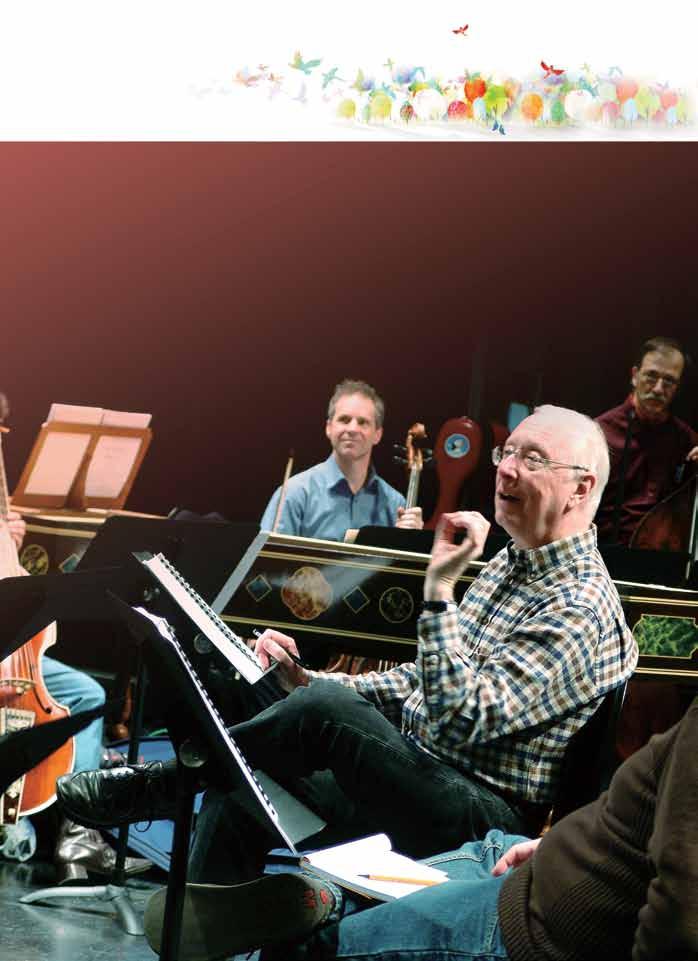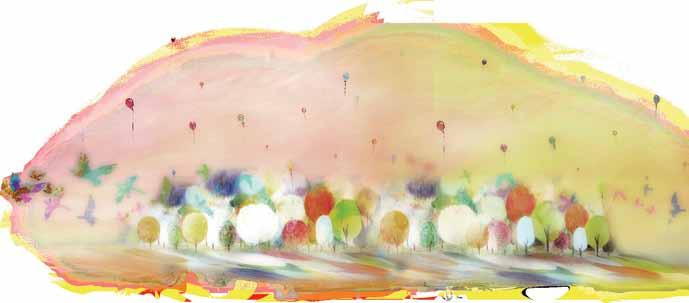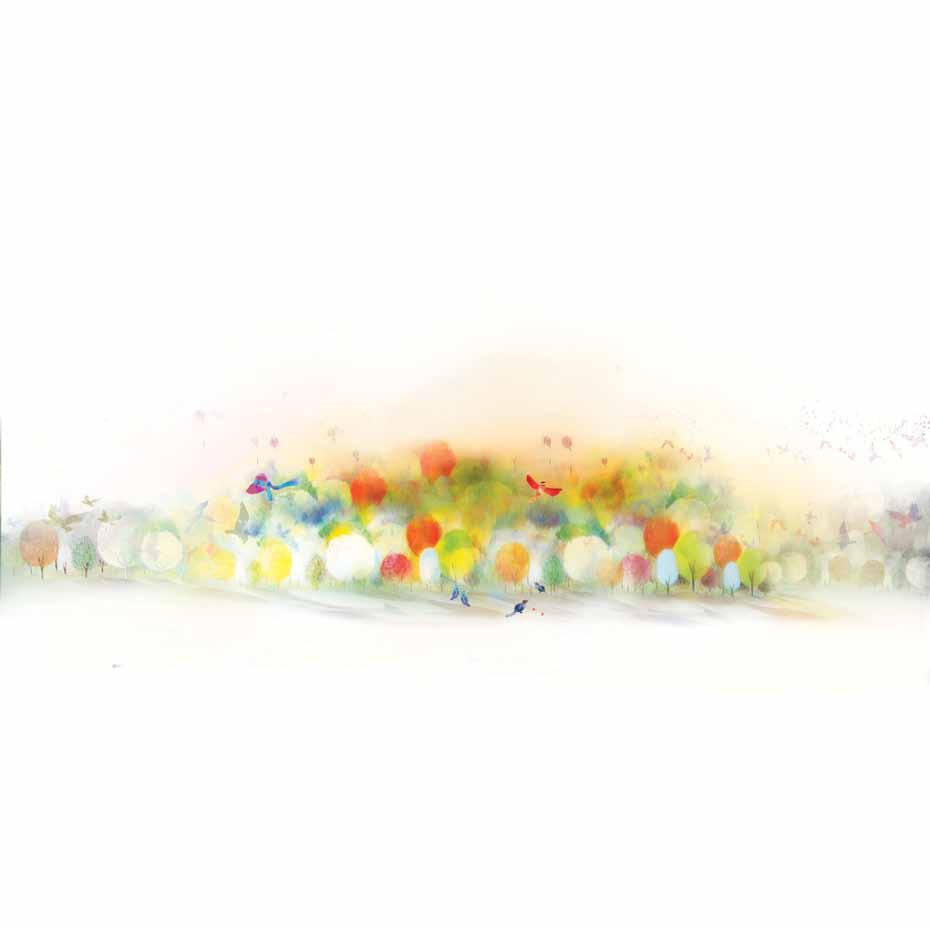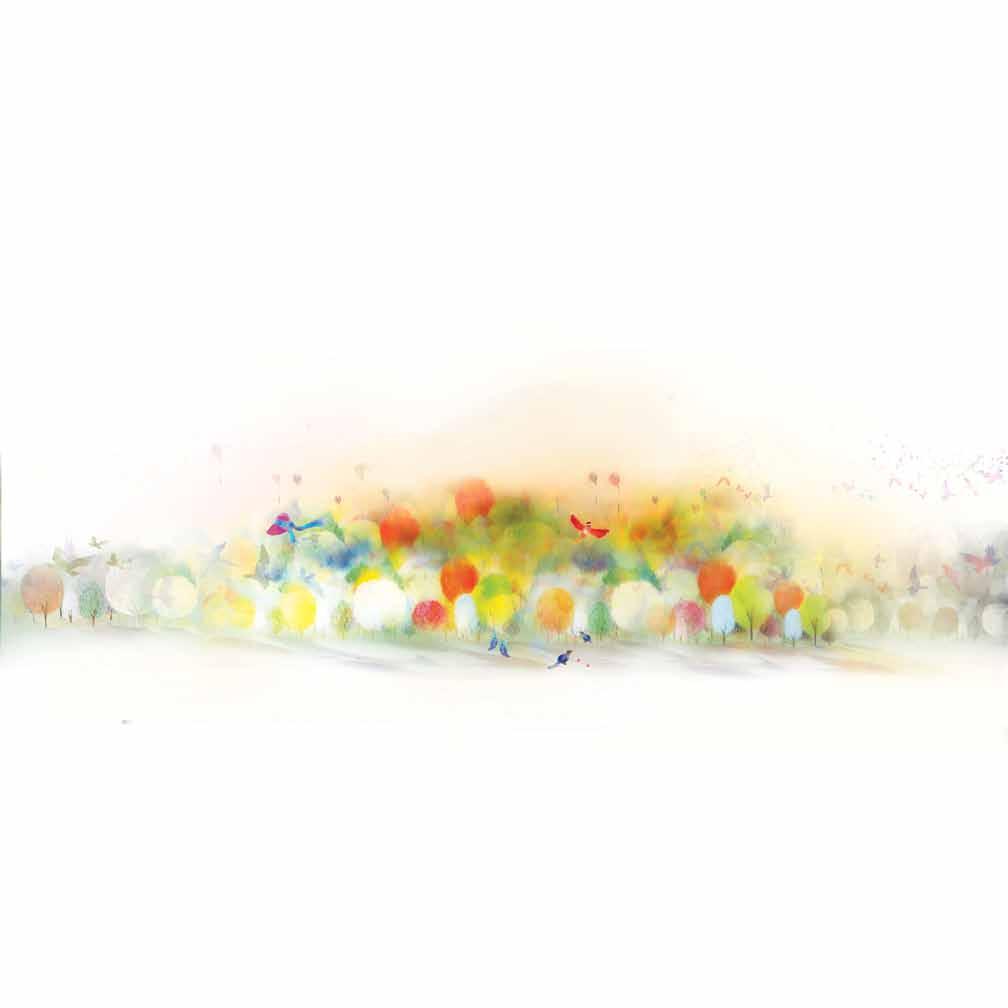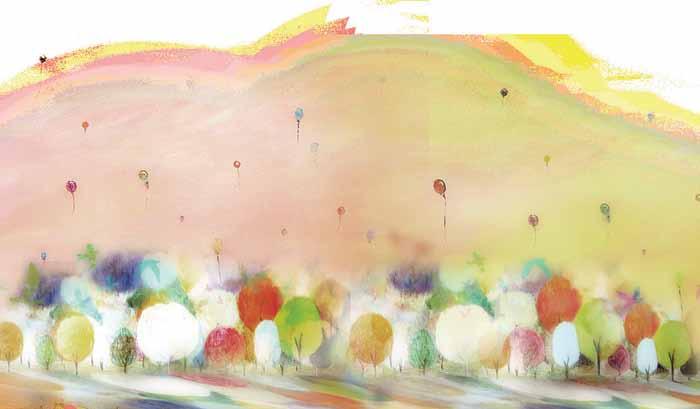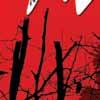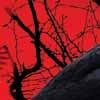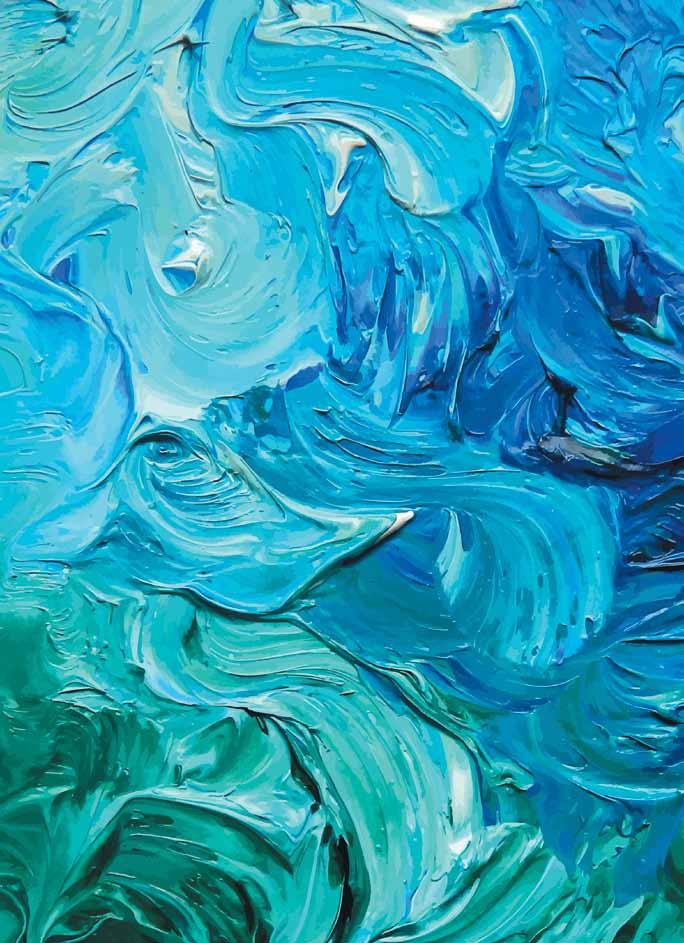Hong Kong Arts Festival (HKAF)
香港藝術節 於 1973 年正式揭幕,是國際藝壇中重要的 文化盛事,於每年 2 、 3 月期間呈獻約 140 場演出 及逾 250 項「加料」和教育節目 ,致力豐富香港的文化生 活。
香港藝術節是一所非牟利機構,2015年藝術節的年度預 算約港幣 1 億 1 千 2 百萬,當中接近三成來自香港特區 政府的撥款,約四成來自票房收入,而餘下的逾三成則 來自各大企業、熱心人士和慈善基金會的贊助和捐款。
香港藝術節 每年呈獻眾多 國際演藝名家 的演出,例如: 塞西莉亞.芭托莉、荷西.卡里拉斯、馬友友、菲力 普.格拉斯、庫特.馬素爾、列卡杜.沙爾、米高.巴 里殊尼哥夫、蕭菲.紀蓮、奇雲.史柏西、羅伯特.威 爾遜、皇家阿姆斯特丹音樂廳樂團、聖彼得堡馬林斯基 劇院、巴伐利亞國立歌劇院、紐約市芭蕾舞團、巴黎歌 劇院芭蕾舞團、翩娜.包殊烏珀塔爾舞蹈劇場、雲門舞 集、星躍馬術奇藝坊、皇家莎士比亞劇團、柏林劇團及 中國國家話劇院等。
香港藝術節積極與本地演藝人才和新晉藝術家合作,每 年委約及製作多套由知名及新晉藝術家參與的全新戲 劇、室內歌劇、音樂和舞蹈作品,並同步出版新作劇 本,不少作品更已在香港及海外多度重演。
香港藝術節 大力投資下一代的 藝術教育 。「青少年之
友」成立23年來,已為逾700,000位本地中學生及大專 生提供藝術體驗活動。藝術節近年亦開展多項針對大、 中、小學學生的藝術教育活動,並通過「學生票捐助計 劃」每年提供逾8,500張半價學生票。
香港藝術節 每年主辦一系列多元化並深入社區的 「加料 節目」 ,例如示範講座、大師班、工作坊、座談會、後 台參觀、展覽、藝人談、導賞團等,鼓勵觀眾與藝術家 互動接觸。
HKAF, launched in 1973, is a major international arts festival committed to enriching the life of the city by presenting about 140 performances and over 250 PLUS and educational events in February and March every year.
HKAF is a non-profit organisation. The estimated budget for the HKAF in 2015 is around HK$112 million, with just under 30% coming from government funding, around 40% from the box office, and over 30% from sponsorships and donations from corporations, individuals, and charitable foundations.
HKAF presents top international artists and ensembles , such as Cecilia Bartoli, José Carreras, Yo-Yo Ma, Philip Glass, Kurt Masur, Riccardo Chailly, Mikhail Baryshnikov, Sylvie Guillem, Kevin Spacey, Robert Wilson, the Royal Concertgebouw Orchestra, the Mariinsky Theatre, Bavarian State Opera, New York City Ballet, Paris Opera Ballet, Tanztheater Wuppertal Pina Bausch, Cloud Gate Dance Theatre, Zingaro, Royal Shakespeare Company, Berliner Ensemble, and National Theatre of China.
HKAF actively promotes Hong Kong’s own creative talents and emerging artists , and commissions, produces and publishes new works in theatre, chamber opera, music and contemporary dance, many with successful subsequent runs in Hong Kong and overseas.
HKAF invests in arts education for young people . In the past 23 years, our Young Friends has reached over 700,000 secondary and tertiary school students in Hong Kong. A variety of arts education projects targeted at primary, secondary, and tertiary school students has been launched in recent years. Donations to the Student Ticket Scheme also make available more than 8,500 half-price student tickets each year.
HKAF organises a diverse range of Festival PLUS activities in community locations each year to enhance the engagement between artists and audiences. These include lecture demonstrations, masterclasses, workshops, symposia, backstage visits, exhibitions, meet-the-artist sessions, and guided tours.
3.3.2015
香港大會堂音樂廳 Concert Hall, Hong Kong City Hall
www.hk.artsfestival.org
網上追蹤香港藝術節 Follow the HKArtsFestival on
演出長約 2 小時,包括一節中場休息 Running time: approximately 2 hours including one interval
敬請關掉所有響鬧及發光裝置。 Please switch off all sound- making and light- emitting devices.
請勿擅自攝影、錄音或錄影。 Unauthorised photography or recording of any kind is strictly prohibited.
封面照片 Cover photograph © Sylvain Guichard 本場刊採用環保紙張印刷。
《意大利花園》 -第七屆庭院之聲
In an Italian Garden - The 7th Edition of Le Jardin des Voix
繁花古樂團青年聲樂學院
Les Arts Florissants’ Academy for Young Singers
音樂總監 Musical Director
威廉.克里斯蒂 William Christie
學院聯合總監 Co- Director of the Academy
保羅.阿格紐 Paul Agnew
舞台導演 Stage Directors
索菲.丹恩曼 Sophie Daneman
保羅.阿格紐 Paul Agnew
音樂 Music
繁花古樂團 Les Arts Florissants
庭院之聲獨唱家 The Soloists of Le Jardin des Voix
女高音 Soprano
露西亞.馬丁-卡頓 Lucía Martín- Cartón
女中音 Mezzo- Soprano
麗亞.德桑拉 Lea Desandre
假聲男高音 Countertenor
卡諾.韋斯托尼 Carlo Vistoli
男高音 Tenor
尼古拉斯.史葛 Nicholas Scott
男中音 Baritone
雷納托.多切尼 Renato Dolcini
男低音 Bass
約翰.泰勒.沃德 John Taylor Ward
語言指導 Linguistic Coach
麗塔.德.麗達莉絲 Rita De Letteriis
聲樂總監及指導 Chefs de chant & Répétiteurs
班諾.哈托 Benoît Hartoin
帕羅.贊祖 Paolo Zanzu
Dresses of the soloists created by Tougani.
Le Jardin des Voix is coproduced by Les Arts Florissants and the théâtre de Caen.
With the support of The Versailles Foundation Inc. and The American Friends of Les Arts Florissants.
藝術節加料節目
威廉.克里斯蒂與
繁花古樂團大師班
Masterclass with William Christie and Les Arts Florissants
誠邀你親臨此大師班,一探克里斯 蒂及繁花古樂團的樂手如何指導香 港演藝學院巴羅克樂團。
3.3 (二 Tue ) 11:00am-1:00pm
In this masterclass, Maestro Christie and musicians from Les Arts Florissants will work with the baroque ensemble from the Hong Kong Academy for Performing Arts.
合作伙伴 In collaboration with: 香港演藝學院 The Hong Kong Academy for Performing Arts
詳情及網上報名 For details and online registration: www.hk.artsfestivalplus.org
香港演藝學院音樂廳 Concert Hall, HKAPA
旁聽 Observer: $60
英語主講 In English
威廉.克里斯蒂
音樂總監及創辦人
William Christie Musical Director & Founder
克里斯蒂將 17 至 18 世紀法國曲目推廣至更廣的 觀眾群,被譽為重新發掘巴羅克音樂藝術的先 驅。他出生於美國水牛城,曾受業於哈佛大學 及耶魯大學。 1971 年,克里斯蒂移居法國,定 居至今。1979 年創立繁花古樂團。 1987 年,他 將呂利的《亞提斯》搬上巴黎喜歌劇院的舞台, 其後在世界各地公演,獲空前成功。
克里斯蒂是公認的抒情悲劇及歌劇芭蕾大師, 擅長演繹夏邦提耶、拉摩、庫普蘭、蒙東維爾、 坎普拉及蒙特克萊爾的作品,亦精通法國經文
歌及宮廷音樂。克里斯蒂不少意大利曲目演奏 都大獲好評,包括蒙特威爾第、羅西、史格拉 第及蘭迪的作品。其浦塞爾、韓德爾、莫扎特 及海頓的作品演奏亦獲高度評價。
克里斯蒂曾與多位知名戲劇及歌劇導演合作, 例如尚-瑪麗.維雷奇及羅伯特.卡遜,並於享 有盛譽的場地表演,包括法國夏特雷劇院及馬 德里皇家劇院。克里斯蒂經常獲歌劇節及歌劇 院邀請,以客席指揮身份參與演出,如紐約大 都會歌劇院。
克里斯蒂曾為唱片品牌樂滿地、華納古典 / 埃拉 托唱片及維京古典灌錄過百張唱片,於法國及 海外屢獲殊榮。他近期灌錄的唱片有:韓德爾 的《伯沙撒王》及《給卡洛琳皇后的音樂》, 以及由 2013 年庭院之聲得獎聲樂家演唱的《拉 摩先生的花園》。
克里斯蒂致力培育年輕藝術家,為他們打開音 樂演藝事業之門。1982 至 1995 年,他於巴黎音 樂學院擔任教授,負責古樂班,至今仍不時獲 邀為大師班及普羅旺斯艾克斯及昂布羅內等地 的著名學府講課。2007 年開始成為紐約茱莉亞 音樂學院駐校藝術家,每年與繁花古樂團的音 樂家主持兩次大師班。
為了進一步實踐其教育理念,克里斯蒂於 2002
年與繁花古樂團創立庭院之聲學院。2012 年起, 每年八月克里斯蒂也會在其位於法國旺代的庭 院舉辦「威廉.克里斯蒂庭院音樂節」,集合繁 花古樂團、其茱莉亞音樂學院學生及庭院之聲 得獎者,舉辦一系列音樂會及「音樂漫步大道」 演出。
1995 年,克里斯蒂成為法國公民。他的藝術成 就屢獲嘉獎,包括獲頒法國榮譽軍團勳章、法 國藝術及文學勳章及 2005 年龐畢度獎,並於 2008 年成為法蘭西藝術院院士。
Christie is acclaimed as a pioneer in the rediscovery of Baroque music for having introduced the 17th and 18th century French repertoire to a wide audience. Born in Buffalo, US and educated at Harvard and Yale, Christie has lived in France since 1971. He founded Les Arts Florissants in 1979. Major public recognition came in 1987 with the production of Lully’s Atys at the Opéra Comique in Paris, which then went on to tour internationally to huge success.
From Charpentier to Rameau, through Couperin, Mondonville, Campra or Montéclair, Christie is an acknowledged master of tragédie-lyrique as well as opéra-ballet, and is equally at home with the French motet as with music of the court. He has also given many acclaimed performances of Italian works (Monteverdi, Rossi, Scarlatti, Landi), and the works of Purcell, Handel, Mozart and Haydn.
Christie has collaborated with renowned theatre and opera directors, such as Jean-Marie Villégier and Robert Carsen, performing in prestigious venues like the Théâtre du Châtelet and the Teatro Real de Madrid. As a guest conductor, Christie receives regular invitations from opera festivals and opera houses such as the Metropolitan Opera of New York.
His extensive discography includes more than 100 recordings, many of which have won awards and distinctions in France and abroad, with Harmonia Mundi, Warner Classics/Erato and Virgin Classics. His most recent recordings are: Belshazzar and Music for Queen Caroline by Handel, as well as Le Jardin de Monsieur Rameau, which features the winners of the 2013 Jardin des Voix.
Christie is equally committed to the training and professional integration of young artists. A professor at the Paris Conservatoire from 1982 to 1995, he was in charge of the early music class, and is now often invited to give master classes or lead academies such as those at Aix-
en-Provence and Ambronay. Since 2007 he has been artist in residence at the Juilliard School of New York, where he gives masterclasses twice a year accompanied by the musicians of Les Arts Florissants.
Wishing to develop further his work as a teacher, in 2002 Christie created, with Les Arts Florissants, Le Jardin des Voix. The Dans les Jardins de William Christie, which has taken place every August since 2012 in Christie’s gardens in the Vendée, brings together Les Arts Florissants, Christie’s pupils from the Juilliard School, and the winners of the Jardin des Voix for concerts and “musical promenades” in the gardens he created at Thiré.
Christie acquired French nationality in 1995. His numerous accolades include the Commandeur of both the Ordre de la Légion d’Honneur and the Ordre des Arts et des Lettres, and the 2005 Georges Pompidou Prize. He was elected to France’s Académie des Beaux-Arts in 2008.
Les Arts Florissants
享譽國際的繁花古樂團於 1979 年由法國
古鍵琴家兼指揮威廉.克里斯蒂成立, 致力以古樂器演奏巴羅克音樂。
自 1987 年於巴黎喜歌劇院演出呂利的《亞
提斯》後,繁花古樂團在歌劇界聲名大 噪,其他著名製作包括拉摩的作品、蒙 特威爾第的抒情三部曲,以及切斯蒂、 艾羅爾等較鮮為人知的作曲家作品。
樂團曾與知名劇場導演尚-瑪麗.維雷 奇、喬治.拉維利、編舞家法蘭辛.朗
洛斯及貝雅特里斯.馬桑等合作。繁花 古樂團於音樂廳的演出同樣受到廣泛讚 賞,包括音樂會及以「半舞台形式」演 出的歌劇及神劇、室樂、大型節目製作, 以及韓德爾的神劇。
繁花古樂團曾為唱片品牌樂滿地、華納/
埃拉托唱片及維京古典灌錄近 100 張唱 片。2012 年,威廉.克里斯蒂及繁花古 樂團與法國旺代省議會合作,首辦「威 廉.克里斯蒂庭院音樂節」。2013 年, 樂團更創立自己的唱片品牌繁花古樂團 唱片公司。
20 多年來,繁花古樂團為卡昂大劇院的 常駐藝團,並經常獲邀在法國及海外的 學院及藝術節中演出。2015 年 1 月,樂 團成為巴黎愛樂廳常駐樂團。
繁花古樂團於 14 / 15 樂季的重點節目包括 蒙特威爾第的《牧歌集:第六冊》、紀
念拉摩逝世 250 周年的兩個節目:《舞 蹈大師:拉摩》巡迴演出,以及重演拉
摩和蒙東維爾的《大經文歌》等。
One of the world’s most renowned early music groups, Les Arts Florissants is dedicated to the performance of Baroque music on original instruments. The ensemble was founded in 1979 by the Franco-American harpsichordist and conductor William Christie.
Since the 1987 production of Lully's Atys at the Opéra Comique in Paris, Les Arts Florissants have enjoyed their greatest successes in the field of opera. Notable productions include works by Rameau, Monteverdi's lyric trilogy, and works by rarer composers like Cesti and Hérold.
The ensemble has collaborated on productions with renowned stage directors such as Jean-Marie Villégier and Jorge Lavelli, as well as with choreographers Francine Lancelot, Béatrice Massin, and others. Les Arts Florissants enjoys an equally high profile in the concert hall for their many acclaimed concert or semi-staged performances of opera and oratorio, chamber music, programmes for large-scale forces, and Handel’s oratorios.
The ensemble has a discography of nearly 100 recordings for Harmonia Mundi, Warner/Erato and Virgin Classics. In 2012, William Christie and Les Arts Florissants created the festival Dans les Jardins de William Christie, in partnership with the Conseil Général de la Vendée. In 2013 Les Arts Florissants started their own recording label: Les Arts Florissants Editions.
For over 20 years, Les Arts Florissants have been artists in residence at the théâtre de Caen. The ensemble tours widely within France and is regularly invited to perform in overseas academies and festivals. In January 2015, they have become the Resident Ensemble at the Philharmonie de Paris.
Highlights of the group’s 2014/15 season include the performance of the Sixth Book of madrigals by Monteverdi, two programmes marking the 250th anniversary of the death of Rameau – the touring show Rameau, Maître à Danser, and the revival of the concert of Grands Motets by Rameau and Mondonville, and others.
Les Arts Florissants receive financial support from the Ministry of Culture and Communication, the City of Caen and the Région Basse-Normandie. They are artists in residence at the théâtre de Caen.
Le Jardin des Voix
繁花古樂團青年聲樂學院
Les Arts Florissants’ Academy for Young Singers
年,繁花古樂團青年聲樂學院於法 國卡昂成立,專門培訓音樂人才,並迅 速走向國際化。首六屆庭院之聲優勝者 經全球甄選,由來自逾 40 個不同國家的 參加者中選出。兩年一度的學院於卡昂 大劇院進行為期兩個星期的訓練,其後 便到法國、歐洲、美國等地的知名音樂 廳及歌劇院作巡迴演出。
庭院之聲學院為獲選的年輕歌唱家開展 他們的音樂事業:多位學員在學院的音 樂會巡演中找到經理人,並且當中很多 人現已活躍於各大音樂廳及歌劇院。此 外,大部分獨唱家都獲邀在繁花古樂團
庭院之聲學院現時由威廉.克里斯蒂及 保羅.阿格紐指導。
Launched in Caen, France in 2002, the Arts Florissants' academy for young singers is recognised as an exceptional breeding ground of talent and it has quickly taken on an international dimension. The prize winners of the first six sessions, chosen from among candidates representing more than 40 different nationalities, have been recruited all over the world. The biennial academy takes place over two weeks at the théâtre de Caen and then goes on tour performing a dozen or so concerts in renowned concert halls and opera houses in France, Europe and the US.
For the singers selected, Le Jardin des Voix represents a sure path into a professional career: many have found an agent through the academy's concert tours and today many can be found on the stages of the greatest concert halls and opera houses. Moreover, a large majority of the soloists are re-enlisted in the productions of Les Arts Florissants.
Le Jardin des Voix Academy is co-directed by William Christie and Paul Agnew.
保羅.阿格紐
Paul Agnew
庭院之聲聯合總監及舞台導演
Co-director of Le Jardin des Voix & Stage Director 備受推崇的假聲男高音阿格紐於 1992 年加入繁花古樂團,曾參與多部歌劇,包括於巴 黎香榭麗舍劇院演出呂利的《忒修斯》,與馬克.明柯夫斯基等著名指揮合作,亦獲 邀出席如愛丁堡藝術節等多個藝術節。他曾錄製超過百張音樂唱片,包括 Naïve 出版 的《貝多芬藝術歌曲》。
2007 年,阿格紐開始為繁花古樂團製作的節目擔任音樂總監。其中一個由 2010 年開 展的項目是演繹作曲家蒙特威爾第的全部牧歌,他為演奏會擔任指揮,至 2015 年將 演出達 100 場。他現時於繁花古樂團兼任音樂副總監及副指揮。
Agnew joined Les Arts Florissants in 1992. An acclaimed countertenor, he has performed in such operas as Lully's Thésée at the Théâtre des Champs-Elysées, performing with famed conductors including Marc Minkowski and as a regular guest at festivals like the Edinburgh Festival. His discography includes, among more than 100 titles, Beethoven’s Lieder for Naïve.
In 2007, Agnew began to take up the musical direction of a number of projects for Les Arts Florissants. They included a complete cycle of the madrigals of Monteverdi, a project which began in 2010 and will lead him to conduct nearly 100 concerts by 2015. He is currently Associate Musical Director and Associate Conductor of Les Arts Florissants.
索菲.丹恩曼
舞台導演
Sophie Daneman Stage Director
才華橫溢的演唱家丹恩曼曾在多個享譽國際的演奏場地表演,包括倫敦威格摩爾音樂 廳及紐約卡內基音樂廳。丹恩曼演繹過多部作品,例如在巴塞隆拿交響樂團的歌劇《狄 托的仁慈》中扮演塞維莉亞,亦在拉摩的《伊波利特與阿里西》中飾演菲德拉。
除了與威廉.克里斯蒂及繁花古樂團巡迴演出,丹恩曼亦曾與馬連拿爵士及謝洛.萊 斯等合作。丹恩曼錄製過多張唱片,例如與克里斯蒂合作的《阿吉斯與卡拉底亞》 (埃 拉托唱片),贏得 2000 年留聲機唱片大獎最佳巴羅克唱片。丹恩曼不但在繁花古樂團 的庭院之聲學院擔任舞台總監,也導演其他音樂項目,包括在卡昂大劇院同時上演的 兩部拉摩的獨幕歌劇。
An accomplished recitalist, Daneman has appeared at many of the world’s major recital venues, including the Wigmore Hall, London and Carnegie Hall. She has sung Servilia in La Clemenza di Tito with the Barcelona Symphony Orchestra, Phedre in Rameau’s Hippolyte et Aricie, and many other roles.
She has toured extensively with William Christie and Les Arts Florissants, as well as performing with Sir Neville Marriner, Gérard Lesne, and others. Her many recordings include Acis and Galatea (Gramophone award, Best Baroque Vocal recording 2000) with Christie (Erato). In addition to her success as Stage Director for Les Art Florissants’ Le Jardin des Voix programme with Christie, her directing projects have included a double bill of one-act Rameau operas at the théâtre de Caen.
露西亞.馬丁-卡頓(西班牙)
Lucía
Martín-Cartón
(Spain) Soprano
馬丁-卡頓畢業於西班牙華倫西亞音樂學院,主修聲樂,師從安娜.露西亞.查娃、 柏德莉茜亞.洛倫斯、卡萊斯.布多及朴厚山。她曾跟隨皮拉爾.摩瑞爾學習聲樂, 亦曾參加理察.萊維特、蘭伯特.克萊蒙、埃德瓦爾多.洛佩茲.班佐等的大師班。 她曾在華倫西亞音樂宮、巴亞多利卡爾德隆.巴爾卡劇院等演出。馬丁-卡頓曾參與 由荷迪.薩巴爾指揮的第三專業培訓學院,於巴塞隆拿音樂廳及凡爾賽宮演出。她曾 演過的角色包括葛路克《奧菲歐與尤麗迪采》的愛神、莫扎特《魔笛》的帕米娜等。 2015 年 1 月曾參演法爾法迪及地中海合唱團的《拿布果》,飾演米薩娜,由里安納度. 噶西亞.阿拉昂指揮。
Martín-Cartón obtained her singing degree from the Conservatory of Valencia, studying with Ana Luisa Chova, Patricia Llorens, and Carles Budó and Husan Park. She also received vocal lessons by Pilar Moral. She has taken masterclasses with Richard Levitt, Lambert Climent, Eduardo López Banzo, and others. She has performed in Palau de la Música de Valencia, Teatro Calderón de Valladolid, among others. Martín-Cartón has participated in the III Academia de Formación Profesional conducted by Jordi Savall, performing at the Auditori de Barcelona and Chateau de Versailles. She has performed Orfeo et Euridice (Amore) by Gluck, Die Zauberflöte (Pamina) by Mozart, and other roles. In January 2015 performed Nabucco (Misaele) by Falvetti with Capella Mediterranea conducted by Leonardo García Alarcón.
麗亞.德桑拉(法國)
女中音
Lea Desandre (France) Mezzo-Soprano
德桑.拉先後畢業於法國國立布隆尼音樂院、巴黎師範音樂院、威尼斯音樂學院,師 從莎拉.明加多,亦曾跟隨維維卡.朱諾學習。2013 年,德桑拉贏得波爾多歌劇院「年 輕新星」第一名,並曾參加羅馬娜.巴素、羅拔塔.因韋爾尼齊和洛約蒙基金會的大 師班。她曾飾演的歌劇角色包括韋華第《茱迪塔的勝利》的阿巴拉及拉威爾《兒童與 魔法》的松鼠。近期參與的演出包括在香榭麗舍劇院上演、巴奇的《如此凡修力》中 的朵拉貝拉、在波爾多歌劇院舉行獨唱會,以及與莎拉.明加多推出二重唱唱片《威 尼斯之聲》。
Desandre studied at the CRR de Boulogne, the Ecole Normale de Musique de Paris, and the Venice Conservatory “Benedetto Marcello”. She is a student of Sara Mingardo and coaches with Vivica Genaux. In 2013, Desandre won the first prize "Young Hope" of Opéra de Bordeaux. She has participated in masterclasses with Romina Basso and Roberta Invernizzi and the Fondation Royaumont. Her operatic roles include Abra ( Juditha Triumphans by Vivaldi), the Squirrel (L’Enfant et les Sortilèges by Ravel), and others. Her recent projects include Dorabella (Cosi Fanciulli by N. Bacri) at the Théâtre des Champs Elysées; a recital at the Opera de Bordeaux; and Venice Voices, a CD of duets with Sara Mingardo.
© Philippe Delval
© Sandra Lousada
© Alessandro Lourenco
© Christine Ledroit-Perrin
卡諾.韋斯托尼(意大利)
Carlo Vistoli (Italy)
假聲男高音
Countertenor
韋斯托尼畢業於博洛尼亞大學,主修音樂學,並於意大利費拉拉吉羅拉馬.弗雷斯科 巴爾迪音樂學院跟隨女低音桑莉亞.普里娜學習巴羅克演唱技巧。他曾跟國民樂團、 大使樂團等巴羅克樂團一同演出;曾演出的歌劇角色包括亨利.浦塞爾《迪多與伊尼 亞斯》的女巫及約瑟夫.米斯李維塞克《奧運會》中的利希達等。 2012 年,韋斯托尼 於博洛尼亞聖彼得羅.泰爾梅堡贏得吉度.湯巴國際聲樂大賽第一名,並於 2013 年在 聖馬力諾奪得瑞納塔.泰巴爾迪國際聲樂比賽(巴羅克組別)第一名。
Vistoli studied musicology at the University of Bologna and baroque singing performance practice with contralto Sonia Prina at the Girolamo Frescobaldi Conservatory in Ferrara. He has been singing with baroque ensembles such as Ensemble Les Nations, Les Ambassadeurs, and others. His operatic roles have included the Sorceress in Henry Purcell's Dido & Aeneas, Licida in Josef Myslivecˆek's L'Olimpiade, and others. He has won such accolades as the First Prize at the Cleto Tomba Competition in Castel San Pietro Terme (Bologna) in 2012, and the First Prize at the Renata Tebaldi Competition (Baroque section) in San Marino in 2013.
尼古拉斯.史葛(英國)
男高音 Nicholas Scott (UK) Tenor
史葛曾獲英國皇家音樂學院艾頓.約翰爵士獎學金。皇家音樂學院 / 科恩基金會巴赫 清唱劇系列自 2008 年成立以來,史葛一直以合唱成員及獨唱者身份參與演出。他的 演出包括在吉爾福德大教堂演出海頓的《創世紀》,以及在馬爾他維多利亞國際音樂 節舉行獨唱會等。史葛曾參演的歌劇角色包括拉摩《雙子星座》的卡斯特和莫扎特《費 加洛的婚禮》的巴希里奧。最近參與的項目包括為美國樂滿地唱片灌錄查彭提爾的《聖 彼得的背棄》的聖彼得及《阿伯拉罕獻祭》中的以撒。
即將參與的音樂演出包括於牛津大學墨頓學院上演的巴赫《 B 小調彌撒》、新音樂合 奏團演出的浦塞爾《聖西西里亞頌歌》及於伊利大教堂上演的蒙特威爾第《聖母晚禱 1610》。
Scott was awarded a Sir Elton John Scholarship to the Royal Academy of Music, and he has performed both as a member of the chorus and a soloist in the Royal Academy of Music/Kohn Foundation Bach Cantata Series since its foundation in 2008. His engagements have included Hayden’s Creation in Guildford Cathedral, and solo performances at the Victoria International Music Festival in Malta. Scott’s operatic roles include Castor in Rameau’s Castor et Pollux and Don Basilio in Mozart’s Le Nozze di Figaro. Recent projects include a recording of Charpentier’s Le reniement de St Pierre (St Pierre) and Sacrificium Abrahae (Issac) for Harmonia Mundi US.
Forthcoming concerts include Bach’s Mass in B Minor for Merton College Oxford, Purcell’s Ode to St Cecilia with La Nuova Musica and Monteverdi’s Vespers 1610 at Ely Cathedral.
© Werther Scudellari
© Jonathan Hall
雷納托.多切尼(意大利)
Renato Dolcini (Italy)
男中音
Baritone
多切尼以優異成績畢業於帕維亞 / 克雷莫納大學,主修音樂學。他曾參加迪奧.索利 合唱組合及米蘭史卡拉歌劇院學院合唱團;並曾演出占瑪勞莎《秘密婚禮》中的羅賓 遜伯爵和莫扎特《女人心》中的阿方索先生等歌劇角色。他的音樂會演出包括韓德爾 和韋華第的清唱劇、巴赫的《聖誕神劇》及佛瑞的《安魂曲》等。最近的演出包括詹 弗朗切斯科.佩蘭達《聖艾格尼斯彌撒曲》的首個現代版本,以及為璀璨古典唱片演 出及錄製、史特拉達拿的《聖喬望尼.克里索斯托莫》中的同名角色。
Dolcini graduated magna cum laude in Musicology from the University of Pavia/ Cremona. He has sung in many choral ensembles such as Deo Soli Gratis and the choir of the Accademia del Teatro alla Scala. His operatic roles include Conte Robinson in Cimarosa’s Il matrimonio segreto, and Don Alfonso in Mozart’s Così Fan Tutte. In concert he has sung cantatas by Handel and Vivaldi, Bach’s Weihnachts-Oratorium and Fauré’s Requiem, among others. Recent engagements include the first modern performance of Missa Sanctae Agnetis by Gianfrancesco Peranda, as well as the performance and recording for Brilliant Classics the eponymous role in Stradella’s San Giovanni Crisostomo
約翰.泰勒.沃德(美國)
男低音
John Taylor Ward (US) Bass
沃德曾與日本巴赫合唱團、根特聲樂合唱團等在多個大型藝術節及場地演出,包括波 士頓古樂節、巴黎城市國際藝術節及卡內基音樂廳等。作為著名的 17、 18 世紀音樂演 繹者,他亦經常跟當代作曲家及藝術家合作,包括普立茲獎得主卡露蓮.蕭、艾美獎 得主滿室牙齒合唱團等。沃德畢業於北卡羅萊納藝術學院、伊士曼音樂學院及耶魯大 學音樂學院,其博士研究探討有形音符及美國民歌聖詩的表演形式。
Ward has performed in such prestigious occasions and venues as the Boston Early Music Festival, Paris’ Cité Internationale and Carnegie Hall, working with Bach Collegium Japan, Collegium Vocale Ghent, and others. A noted interpreter of music from the 17th and 18th centuries, he also frequently collaborates with contemporary composers and artists, such as Pulitzer Prize winner Caroline Shaw, and the Grammy award winning Roomful of Teeth. Ward is a graduate of the University of North Carolina School of the Arts, the Eastman School of Music, and the Yale School of Music, where his doctoral research focused on the performance practice of shape- note music and American folk- hymnody.
© Accademia Teatro alla Scala
In an Italian Garden
The 7th Edition of Le Jardin des Voix
巴哲尼
《現在我們聚首一堂》,選自《蛋酒音
樂劇,創意牧歌及五聲牧歌第一部》
合唱
史特拉達拿
交響曲 (慢板),選自
《有情人萬歲!萬歲!愛情學院》
威基
《音樂樂無窮》,選自《錫耶納的晚間遊戲,
又名現代音樂樂無窮》
合唱
史特拉達拿
《有情人萬歲!萬歲!愛情學院》
交響曲 (快板)
〈有情人,萬歲!萬歲!〉
合唱
〈不必畏懼〉
韋斯托尼
〈墮入愛河之時〉
馬丁-卡頓及德桑拉
〈絕色之美〉
馬丁-卡頓
〈俏臉之美〉
馬丁-卡頓
〈誰叫他意亂情迷〉
馬丁-卡頓
Adriano Banchieri (1568-1634)
Già che ridotti siamo from Il Zabaione musicale, inventione boscareccia et primo libro de madrigali a cinque voci
All
Alessandro Stradella (1639-1682)
Sinfonia (Lento) from Amanti olà olà, Accademia d’Amore
Orazio Vecchi (1550-1605)
L’humore musicale from Le Veglie di Siena, overo i varii humori della musica moderna
All
Alessandro Stradella
Amanti olà olà, Accademia d’Amore
Sinfonia (Allegro)
"Amanti, olà, olà"
All
"Hor non fia chi paventi"
Carlo Vistoli
"D’amore a l’invito"
Lucía Martín- Cartón and Lea Desandre
"Che sia della beltà"
Lucía Martín- Cartón
"La beltà d’un vago viso"
Lucía Martín- Cartón
"Chi va se delirante"
Lucía Martín- Cartón
韓德爾
〈啊!煉獄的幽靈,啊!邪惡的幻影!〉,
選自《奧蘭度》,HMV31,(第二幕,第十場)
韋斯托尼
德.衛爾特
〈不再是淚水〉,選自《為五、六、七 聲部而作的第五部牧歌》
合唱
韋華第
〈啊,不忠的,背信棄義的〉,選自《瘋狂的
奧蘭度》, RV Anh.84 (第二幕,第十五場)
多切尼
〈嫉妒,你在吞噬我的靈魂〉,
選自《奧托尼在維拉》, RV729
德桑拉
〈摯愛的雙眸〉,選自《美善戰勝了愛與恨》
史葛
史特拉達拿
選自《有情人萬歲!萬歲!愛情學院》
〈雖無法踏進愛情學院之門〉
沃德
〈當心愛情之箭〉
沃德
〈幻滅與理性結合時〉
韋斯托尼
〈愛情是博學之師〉
合唱
占瑪勞莎
〈瞧這滿口惡言的瘋婦!〉,選自《憂慮的劇 團經理人》,兩幕喜歌劇 (第一幕,第一場)
馬丁-卡頓、德桑拉、史葛及多切尼
George Frideric Handel (1685-1759)
"Ah! stigie larve, ah! scelerati spettri!" from Orlando, HWV31 (Act II, Scene 10)
Carlo Vistoli
Giaches de Wert (1535-1596)
"Queste non son più lagrime" from Il quinto libro de madrigali a cinque, sei et sette voci
All
Antonio Vivaldi (1687-1741)
"Ah sleale, ah spergiura" from Orlando furioso, RV Anh.84 (Act II, Scene 15)
Renato Dolcini
"Gelosia, tu già rendi l’alma mia" from Ottone in Villa, RV729
Lea Desandre
"Care pupille" from La Virtù trionfante dell’Amore e dell’Odio, overo ll Tigrane
Nicholas Scott
Alessandro Stradella
From Amanti olà olà, Accademia d’Amore
"Benché ascritto non sia d’amor nell’Accademia"
John Taylor Ward
"Si guardi dai dardi d’Amor"
John Taylor Ward
"Unito il Disinganno a la Ragione"
Carlo Vistoli
"Sono Maestro è Amore"
All
Interval
Domenico Cimarosa (1749-1801)
"Vè che matta, maledetta!" from L’impresario in angustie, opera buffa in two acts (Act I, Scene 1)
Lucía Martín- Cartón, Lea Desandre, Nicholas Scott and Renato Dolcini
海頓
選自《歌女》, Hob.XXVIII:2 (第一幕,第四場)
〈美麗的女士們!〉
史葛
〈我該怎樣做?〉
史葛
〈你們覺得怎麼樣?〉
馬丁-卡頓、德桑拉及
史葛
薩羅
《從加那利群島來的劇團經理人》
插曲二 (節錄)
德桑拉
插曲一 (節錄)
德桑拉及沃德
莫扎特
〈手上的一吻〉,選自《給男低音 及樂團的短詠嘆調》,KV541
多切尼
海頓
〈毒婦!賤貨!叛徒!〉,選自《歌女》, Hob.XXVIII:2 (第一幕,第八場)
馬丁-卡頓、德桑拉、 史葛及多切尼
朴波拉
獨唱清唱劇
《啊,若我的心》
韋斯托尼
海頓
〈我頭眩迷惘〉,選自《騎士奧蘭度》,
Hob.XXVIII:11
合唱
Joseph Haydn (1732-1809)
From La Canterina, Hob.XXVIII:2 (Act I, Scene 4) "Donne belle!"
Nicholas Scott
"Che mai far deggio?"
Nicholas Scott "Che dici?"
Lucía Martín- Cartón, Lea Desandre and Nicholas Scott
Domenico Sarro (1679-1744)
L'impresario delle Canarie
Intermezzo Secondo (excerpts)
Lea Desandre
Intermezzo Primo (excerpts)
Lea Desandre and John Taylor Ward
Wolfgang Amadeus Mozart (1756-1791)
"Un bacio di mano" from Ariette für Bass und Orchester, KV541
Renato Dolcini
Joseph Haydn
"Scellerata! mancatrice! traditrice!" from La Canterina, Hob.XXVIII:2 (Act I, Scene 8)
Lucía Martín- Cartón, Lea Desandre, Nicholas Scott and Renato Dolcini
Niccolò Porpora (1686-1768)
Cantata for solo voice
Oh se fosse il mio core
Carlo Vistoli
Joseph Haydn
"Son confuso e stupefatto" from Orlando paladino, Hob.XXVIII:11
All
是晚演出曲目及次序或有更改 Pieces and their order of performance are subject to change
In an Italian Garden The 7th Edition of Le Jardin des Voix Text: Paul Agnew
前兩屆庭院之聲以法語曲目為主,先是 集中於 17 世紀中期呂利的音樂,尤其是 他的經典作品《亞提斯》;其後為紀念 2014 年拉摩逝世 250 周年,我們集中演 繹圍繞拉摩生平的 18 世紀作品以及其創 作。現在,我們認為是時候聚焦於孕育 出巴羅克音樂、當時所有歌唱家都非常 熟悉的語言 意大利語。
於第七屆庭院之聲中,或許只演奏意大 利作曲家的作品或許是最直截了當的做 法,但意大利語的使用並不限於意大利: 從蒙特威爾第、他在克雷莫納及曼托瓦 的老師、在羅馬及倫敦的韓德爾以及在 薩爾茨堡及維也納的莫扎特,意大利語 都主導着這些時期的音樂。第七屆庭院 之聲旨在探索這最具音樂性的語言,從 德.衛爾特、威基及巴哲尼最早期的巴 羅克音樂,穿梭到史特拉達拿創立的獨 唱角色,到韓德爾及韋華第越趨成熟的 歌劇,還有占瑪勞莎的洛可可曲風,最 後跟海頓和莫扎特一同邁進古典時期。
音樂會以巴哲尼的牧歌喜劇《蛋酒音樂 劇》揭開序幕,將整個樂組聚集起來。
歌唱家全體登場後,史特拉達拿和威基 的作品隨即響起,展現巴羅克時期最重 要的美學元素:「情感塑造」。「情感 塑造」可被形容為文本的情感色彩,用 來定性及誘發音樂的特性。威基要求我 們增強音樂中各種情感或幽默元素的對 比;史特拉達拿圍繞愛的主題,挑戰歌 唱家以歌聲完美演繹各種情緒狀態。音 樂會的第一部分探索了音樂描繪及深化 情緒的能力。愛、恨、嫉妒、幻滅及憤
In our previous two editions of Le Jardin des Voix we were concentrated on the French language; firstly, that of the mid 17th century around the music of Lully, and in particular his masterpiece, Atys; and subsequently, music from the 18th century around the life and works of Rameau for his anniversary in 2014. It is timely, therefore, that we look towards the language in which baroque music was born, and that was to become the mother tongue of all singers of the era – Italian.
It would be tempting to turn exclusively to Italian composers for our 7th Edition of Le Jardin des Voix, but the Italian language was not exclusive to Italy, it was the dominant language of the music of the epoch, from Monteverdi and his teachers in Cremona and Mantua, to Handel in Rome and London and Mozart in Salzburg and Vienna, and so our 7th Edition is an exploration of this most musical of languages, from the very birth of the Baroque, in the music of De Wert, Vecchi and Banchieri, through the establishment of the solo protagonist in Stradella, to the mature operatic voices of Handel and Vivaldi; then on into the Rococo with Cimarosa, and finally to the Classical realm with Haydn and Mozart.
Our concert opens with the assembling of our Ensemble in Banchieri’s comic madrigal Il Zabaione musicale. Once the singers are assembled, the works of Stradella and Vecchi introduce one of the fundamental elements in the aesthetic of the Baroque, the affect. The affect could be described as the emotional colour of the text that determines and drives the character of the music. Vecchi demands that we mount a competition between the various emotions or humours in music, and Stradella, through the voice of Amore, challenges each singer to champion different emotional states in their singing. The first part of our concert is, therefore a voyage into the power of music to describe and amplify the emotions. Emotions like love, hate, jealousy, disenchantment and fury are expressed through the vehicle of Ariosto’s great Orlando furioso, perhaps the most influential text of the period. 意大利花園



怒在阿里奧斯托的巨著、大概是該時期 最具影響力的文本《瘋狂的奧蘭度》中 如果音樂會的上半場描述了巴羅克音樂 的基本素材的話,那下半場就是以輕鬆 的手法來探討當時如何演繹音樂。下半 場以占瑪勞莎《憂慮的劇團經理人》開 始,一位焦慮的作曲家嘗試滿足幾位女 主角的無理要求。從占瑪勞莎我們轉到 海頓的喜歌劇《歌女》,由男低音飾演 的年輕作曲家聲稱為天真的女高音創作 了充滿愛意的曲子,藉此勾搭她。然後 在《從加那利群島來的劇團經理人》中 飾演經理人的男高音進場,述說了薩羅 對當時音樂行業嚴厲的批判。他傾慕年 輕女中音,希望成為其經理人,這樣女 中音(當然還有他自己)便會名成利就。
對幾位熱烈的追求者來說,莫扎特的幾 個音符便是靈丹妙藥,由剛進場的男中 音唱出,瞬間融化女主角們善變的心。
音樂會來到尾聲,《瘋狂的奧蘭度》再 次出現,這次演繹的是海頓的版本,來 一場大團圓結局。
這趟音樂之旅帶我們穿梭歐洲各地,跨 16 世紀末走到 18 世紀, 我們探索了豐富的情感表達,見證了戲 劇性音樂的起始至成熟;充分展現我們 年輕歌唱家的出色技巧的同時,我亦期 望觀眾於《意大利花園》中享受到豐富 的旋律、和聲及幽默趣味。
If the first half of our concert describes the essential ingredients of baroque music, the second part examines, in a light hearted way, how music was practiced at the time. We open with Cimarosa’s L’Impresario in angustie . An anxious composer is attempting to write an opera to the impossibly exacting demands of his various divas. From Cimarosa, we move to Haydn’s comic opera La Canterina in which the young composer, our bass, attempts to seduce the innocent soprano with amorous music written, as he claims, exclusively for her. Enter the tenor Impresario (from the Canaries… ?) in Sarro’s scathing critique of the business of music. His ambition is to become an agent to our young mezzo-soprano with whom he has fallen in love, and in doing so, to bring her (and of course himself) fame and fortune. To the fury of these ambitious suitors, it requires only a few notes of Mozart, sung by the newly arrived baritone, to soften our ambitious divas, whose fickle hearts are melted by the mellifluous music. And our concert ends, again with Orlando furioso, this time in Haydn’s music, where all is resolved for the good.
Our musical journey has taken us throughout Europe, and through two centuries of music; we have explored a rich palette of emotions, first tested at the dawn of dramatic music in the late 16th century and brought to fullness during the 18th century; we have tested the skills of our brilliant young singers and, I hope we have led the listener through an Italian Garden rich in melody, harmony and humour.
Programme notes
典雅的牧歌是意大利文藝復興晚期多種 音樂娛樂活動的創作基礎。在歌劇出現 前,作曲家習慣用戲劇性的牧歌創造帶 有音樂的戲劇形式,而最普遍的便是牧 歌喜劇,一系列並非於舞台上演出、卻 充滿戲劇元素的牧歌。牧歌喜劇不間斷 地演唱,有條不紊地敘述關於愛、嫉妒 及美等主題的故事。牧歌喜劇經常被視 為歌劇前身,而奧拉吉奧.威基則更準 確地把牧歌喜劇定義為「為耳朵而寫的 戲劇作品」,那是由於劇中的歌聲與角 色沒有清晰的對應關係;歌聲是用來描 繪、或更多時候用來誇張地刻畫人物性 格。
巴哲尼 是其中一位創作牧歌喜劇的先 驅。他的五部曲牧歌 《蛋酒音樂劇》 以 美味的意大利甜點命名,曲集於 1604 年 出版。這套「為耳朵而寫的戲劇作品」 承襲了意大利源遠流長的文學及音樂傳 統,幽默地將嚴肅的角色與意大利即興 喜劇中帶着面具的人物並列。巴哲尼選 擇了鄉郊作為背景,更準確的說是一片 清新怡人的草原,在這個田園環境中有 仙子、牧羊人、神話人物,他們在 《蛋 酒音樂劇,創意牧歌及五聲牧歌第一部》 開首樂章 《現在我們聚首一堂》 中出現 在觀眾眼前。
對於擅長創作宗教及世俗室樂作品的 史 特拉達拿 來說,音樂及藝術顯然是對生 命的模仿。他有數次戀愛經驗,亦曾由 媒人安排與異性見面,但後來跟一位熱 那亞貴族婦人傳出醜聞,導致他遇刺身 亡。史特拉達拿對愛情的浪漫想像於好 幾部舞台作品中重現,其中為 1665 年羅 馬嘉年華季節而寫的 《有情人萬歲!萬 歲!愛情學院》 由瑪莉娜.孟西尼.歌
Madrigals in elevated style formed the basis of various musical entertainments during the late Italian Renaissance. Before the advent of opera, composers habitually turned to the dramatic madrigal in an effort to create new musicodramatic forms. Among the most popular forms was the madrigal comedy, an unstaged but dramatic collection of madrigals. Sung consecutively, these madrigal comedies told a coherent story involving such subjects as love, jealousy, and beauty. Frequently classified as precursors of opera, Orazio Vecchi more properly defined the madrigal comedy as “theatre for the ear,” as there is no clear correspondence between voices and characters. Instead, the voices are used as a means to describe, or more frequently, caricature various figures.
One of the founding creators of the madrigal comedy was Adriano Banchieri. His book of five-part madrigals published under the title Il Zabaione musicale — in reference to a delectable Italian dessert — was issued in 1604. Ironically juxtaposing serious characters with the masked characters of the Commedia dell’Arte, this “theatre for the ear” follows a long line of Italian literary and musical traditions. Banchieri opted for a country setting — more precisely described as a pleasant meadow — and this pastoral background includes nymphs, shepherds and mythological figures that introduce themselves to the audience in the opening Già che ridotti siamo from Il Zabaione musicale, inventione boscareccia et primo libro de madrigali a cinque voci (The Musical Zabaione, pastoral invention and first book of madrigals for five voices).
For Alessandro Stradella , who composed both sacred and secular chamber works, music and the arts were a clear imitation of life. The composer was involved in a number of amorous intrigues and matchmaking enterprises, and following a scandal involving a Genoese noblewoman, was stabbed to death by hired assassins. Stradella’s romantic fascination was mirrored in a number of stage works. Composed for the Roman Carnival season of 1665, Amanti olà olà, Accademia d’Amore (Lovers, ho! ho! The Academy of Love ) was commissioned by Princess Marina Mancini Colonna. Various allegorical figures engage in discussions on the subject of love. 樂曲介紹
隆娜公主委約創作,幾個寓言人物在談
論愛的話題。史特拉達拿把音樂分成大 協奏曲及小協奏曲曲式,讓宣敘調與詠
嘆調交替,並加插幾首戲劇化的牧歌, 成功糅合了當時的音樂及戲劇傳統。
威基 以其牧歌喜劇聞名。他在 1604 年創 作的 《錫耶納的晚間遊戲,又名現代音 樂樂無窮》 是一系列愉悅的牧歌,敘述 由一班錫耶納學院人員籌辦、為期三晚 的文學及音樂遊戲:兩個競爭的演出團 隊以諷刺喜劇演譯時興的音樂,以取悅 遊戲主持人。除了模仿西西里、德國、 法國及威尼斯的音樂風格,這套牧歌喜 劇還以芭蕾形式的演出寓意對愛情的追 求。最後,劇中每個人都沉醉在愛的歡 愉中,並以刺激感官的舞蹈作結。劇中 誇張諷刺的音樂手法、如謎語般的詞句、 繞口令及生動的角色扮演,荒誕離譜卻 令人拍案叫絕。
韓德爾 以牧歌喜劇為基礎,又借鑒於史
特拉達拿對該劇種的改良,創作了描繪 嫉妒的歌劇 《奧蘭度》 。原由閹伶賽尼 西諾飾演的英雄奧蘭度瘋狂地愛上異教 徒公主安祖尼卡,但她已跟另一人相戀。
因愛成狂的奧蘭度在第二幕完結時設局 謀殺公主及其愛人。魔術師佐羅阿斯特 羅在此時騎着飛行馬車出現,把忌恨的
主角帶走,阻止了悲劇發生。韓德爾採 用了靈活的音樂形式,摒棄了莊嚴歌劇 一貫的傳統。《奧蘭度》創新地融合詠 敘調及詠嘆調段落,被英國音樂學家溫 頓.迪恩形容為「韓德爾歌劇中音樂層 次最豐富的作品」。
儘管生於低地國家, 德.衛爾特 跟意大 利費拉拉的音樂中心關係緊密。他在戲 劇牧歌的發展中擔負重要角色,其曲集 《為五、六、七聲部而作的第五部牧歌》 在 1571 年於威尼斯出版。德.衛爾特從
Dividing the orchestra into concerto grosso and concertino, alternating recitatives and arias and interspersing a number of dramatic madrigals, Stradella accomplishes a remarkable synthesis of the musical and theatrical conventions of his time.
Orazio Vecchi is primarily known for his madrigal comedies. His Le Veglie di Siena, overo i varii humori della musica moderna (The Night Games of Siena, or the various humours of modern music) of 1604 is a delightful succession of madrigals that portray three nights of literary and musical games organised by the members of the Academy in Siena. Two rivaling performance troupes attempt to impress their hosts with comic parodies of fashionable musical trends. Imitating Sicilian, German, French and Venetian musical styles, this madrigal comedy also features an allegorical hunt for love, presented in the form of a ballet. In the end, everybody delights in the joy of love, represented by a sensual final dance. Musical caricatures and riddles, tongue twisters, and lusty roleplay make for an outrageous musical comedy.
Building on the influence of madrigal comedies, and particularly Stradella’s refinements, George Frederic Handel encoded the topic of jealously in his opera Orlando. The hero — originally sung by the great castrato Senesino — falls desperately in love with the pagan princess Angelica, who is in love with another man. Driven to madness, Orlando is set on murdering the princess and her lover at the end of Act II. It takes the intervention of the magician Zoroastro, who swoops in on his flying chariot and takes the jealous hero away, to avert a catastrophe. Musically, Handel moves away from the formal conventions associated with opera seria and adopts a flexible approach to musical form. Inventively blending arioso and aria passages, Orlando was described by English musicologist Winton Dean as “the musically richest of all Handel operas”.
Although born in the Low Countries, Giaches de Wert was intimately connected with the musical centre of Ferrara, Italy. He was instrumental in developing the style of the dramatic madrigal, and his Il quinto libro de madrigali a cinque, sei et sette voci (The fifth book of madrigals for five, six, and seven voices) was published in Venice in 1571. Taking his inspiration from the text of the influential epic poem Orlando furioso by Ludovico Ariosto, de Wert musically paints the tearful agony of jealousy.
盧多維科.阿里奧斯托的史詩巨著《瘋 狂的奧蘭度》獲得靈感,以音樂描繪了 嫉妒的悲痛。
阿里奧斯托的詩歌也為 韋華第 的幾部歌 劇提供主題靈感。他在 1727 年寫的 《瘋 狂的奧蘭度》 把戲劇傳統與現代性相結 合。韋華第的首部歌劇《奧托尼在維拉》
於 1713 年首演,嫉妒在劇中轉化成激烈 憤怒的花腔段落。為 1724 年羅馬嘉年華 季節而作的集成歌劇 《美善戰勝了愛與 恨》 歌頌愛的美善及力量,與史特拉達 拿在《愛情學院》中感性的終章相呼應。
到了 1720 年,在歌劇中戲謔業界百態成 為潮流。 占瑪勞莎 在 1786 年創作了歌劇 式鬧劇 《憂慮的劇團經理人》 :劇院經 理任兩位女主角擺佈,她們不停跟劇院 職員吵架,要求華麗戲服及豐厚薪金, 後來另外兩位女主角的加入更令情況惡 化,最終導致經理人破產收場。占瑪勞 莎以結構單一的音樂,將劇中線性和直 接的概念並列呈現於觀眾眼前。作品並 非只是一首接一首的詠嘆調與二重唱, 而運用了結構緊密的音樂敘事形式,未 有因追求音樂上的創新而失卻其戲劇 性。
歌劇式鬧劇在 18 世紀後期非常受歡迎, 也由於它們輕鬆簡潔,這種劇通常會在 兩幕莊嚴歌劇之間上演,如 海頓 於 1766 年為埃斯特希斯王子而寫的 《歌女》 便 屬於這劇種。故事講述歌女加斯帕蓮娜 跟母親亞波羅莉雅同住在傾慕她的艾托 利所提供的房子,當歌唱導師及作曲家 皮拉治奧到達時,艾托利假扮成商人並 被送走。皮拉治奧教導加斯帕蓮娜唱特 別為她而寫的詠嘆調,並向她求婚。皮 拉治奧離開後,加斯帕蓮娜讓艾托利回 來,卻碰巧皮拉治奧因遺留了東西折返, 發現加斯帕蓮娜跟艾托利在一起。兩個
Ariosto’s poem also inspired Antonio Vivaldi to write a number of operas on the subject. His Orlando furioso of 1727 merges theatrical traditions and modernity. In Vivaldi’s first opera, Ottone in Villa , premiered in 1713, jealousy is personified in a whirlwind of angry coloratura passages. Composed for the Roman Carnival season of 1724, Vivaldi’s pasticcio La Virtù trionfante dell’Amore e dell’Odio, overo ll Tigrane (The Triumph of Virtue over Love and Hate) glorifies the virtues and power of love, a sentiment resoundingly echoed in Stradella’s concluding statement from The Academy of Love
By 1720 it had become extremely fashionable to parody theatrical environments in opera. Domenico Cimarosa wrote his operatic farce L’impresario in angustie (The Impresario in Distress) in 1786. The manager of a theatre is at the mercy of his two leading ladies. Constant fighting among his staff and demands for lavish stage costumes and rich salaries, exacerbated by the arrival of two additional leading ladies, eventually force the impresario into bankruptcy. Cimarosa’s music parallels the linear and direct conception of the drama by employing a simple homogeneous structure. Yet, it is not merely a succession of arias and duets, but a tightly constructed musical discourse that never lingers on musical invention at the loss of theatricality.
Operatic farces became hugely popular in the later parts of the 18th century, and because of their light-hearted nature and brevity, they used to be performed between the acts of opera seria. That was certainly the intent of Joseph Haydn’s La Canterina (The Songstress) written for Prince Esterhazy in 1766. The songstress Gasparina lives with her mother Apollonia in an apartment provided by her suitor Don Ettore. When the singing instructor and composer Don Pelagio arrives, Don Ettore is disguised as a merchant and sent away. Don Pelagio teaches Gasparina a new aria he has written specifically for her, and asks for her hand in marriage. After Don Pelagio leaves, Gasparina calls back Don Ettore. As it happens, Don Pelagio has left something behind, and catches Gasparina and Don Ettore together. The men are outraged at having been deceived, and Gasparina pleads for forgiveness and mercy. She pretends to faint, and the men, although recognising Gasparina’s greed, lavish her with money and diamonds. Enhancing the comic situation is the fact that Don Ettore can be played by a woman, and Apollonia by a man.
男人感到被矇騙,非常憤怒,加斯帕蓮
娜哀求他們原諒。她假裝昏倒,然而雖 然兩男都知道加斯帕蓮娜的貪婪,卻仍
以金錢和鑽石討她歡心。此劇可以女演
員飾演艾托利及男演員飾演亞波羅莉雅
來增加喜劇感;海頓這部作品是喜歌劇 劇目中的瑰寶。在最後幾幕四位獨唱者 成了合唱,而長笛、雙簧管、圓號為原
來精彩的戲劇片段更添色彩。
著名詩人、作家及歌劇作詞人皮埃特羅. 梅塔斯塔奇奧在個人信箋中,痛斥歌劇 製作中歌唱家、音樂家及經理人的陋習。
為了排遣憤慨,他寫了處境喜劇 《從加 那利群島來的劇團經理人》 。拿坡里作
曲家 薩羅 迅速為劇本譜曲,而這部喜劇
大作就在梅塔斯塔奇奧的莊嚴歌劇《被 遺棄的迪多》兩幕之間上演。歌劇演員
多蓮娜代表音樂藝術的原來面目,她不 斷投訴時下不堪的作曲家只注重歌唱部 分的花巧裝飾;相反,經理人尼比奧則 代表音樂藝術的實際表現:他只側重於
把演出者浪漫化,認為文詞完全不重要。
至於觀眾,梅塔斯塔奇奧認為他們太忙 於社交,根本不重視作品的意義。梅塔 斯塔奇奧的文本大受歡迎,被多位作曲 家譜成樂章。
1788 年, 莫扎特 獲委約為帕斯夸萊.安
弗西的歌劇《嫉妒幸福》創作詠嘆調, 於是為男低音及樂團寫了短詠嘆調 〈手 上的一吻〉 ,主要樂旨來自他的 C 大調 第 41 交響曲《木星交響曲》。莫扎特為 吉羅先生教導學生龐培奧關於求愛及婚 姻的難題這一幕提供了令人愉悅的音樂 襯托。
著名拿坡里作曲家及歌唱導師 朴波拉 的 學生人才輩出,包括約翰.哈塞、海頓 及威爾斯親王等。為了討好他的皇室贊
助人,朴波拉創作了多首根據梅塔斯塔
Haydn’s musical score is a gem of the buffa repertoire. The four vocal soloists function as a chorus in the opera’s finale scenes, and the glorious dramatic segments are colorfully supported by flutes, oboes and horns.
In his personal correspondence, the famed poet, writer and librettist Pietro Metastasio bitterly complained about the unsavory habits of singers, musicians and impresarios involved with opera production. To vent his frustration, he wrote a comic scenario entitled L’impresario delle Canarie ( The Impresario from the Canaries ). The Neapolitan composer Domenico Sarro quickly set the text to music, and his comic masterpiece was performed between the acts of Metastasio’s opera seria Didone abbandonata. The opera singer Dorina represents musical art as it should be. She incessantly complains about those horrible modern composers that are only interested in vocal ornamentation. The impresario Nibbio, on the other hand, represents musical art as it is actually practiced. He is primarily interested in romancing the singer, and believes that texts are not important at all. Audiences, he reckons, are too busy with social obligations to really care about the meaning. Metastasio’s text became enormously popular, and inspired a large number of additional musical settings.
In 1788, Wolfgang Amadeus Mozart was commissioned to compose an insertion aria for Pasquale Anfossi’s opera Le gelosie fortunate . Mozart responded with the arietta “Un bacio di mano” ( “A kiss on the hand” ) for bass and orchestra, which features prominently a musical theme from his Symphony No 41 in C major, known as the Jupiter Symphony . Mozart’s setting delightfully complements Monsieur Girò as he lectures his student Don Pompeo on the pitfalls of courtship and marriage.
The celebrated Neapolitan composer and singing teacher Niccolò Porpora taught, among others, Johann Hasse, Joseph Haydn, and the Prince of Wales. To please his royal benefactor, Porpora composed a number of solo cantatas to librettos by Pietro Metastasio. Oh se fosse il mio core ( Ah, if only my heart ) presents the desperate pleas of a tormented lover hoping for a chance to prove his love, before drawing a highly temperamental conclusion.
Coming full circle, Orlando paladino ( The Paladin Orlando) is based on Ariosto’s poem Orlando furioso and
奇奧的文本而寫的獨唱清唱劇。 《啊,
若我的心》 中為愛受折磨的情人渴望證 明其愛意,歌曲以澎湃起伏的音樂作結。
回到原點, 海頓 的 《騎士奧蘭度》 是以 阿里奧斯托的史詩《瘋狂的奧蘭度》為 文本,由海頓創作音樂。作品巧妙地把 英雄及喜劇元素混合,是海頓在世時最 受歡迎的歌劇。作品音樂素材豐富,包 括一系列精彩的詠嘆調,讓歌者展示演 唱技巧,同時加強張力。奧蘭度因愛成 癡、憤怒、瘋狂,因為他傾心的對象安 祖尼卡愛的是米多羅。為了阻止奧蘭度 追殺一對情人,魔術師艾捷娜把他帶到 地下世界,讓魔法河流洗掉他的癡狂。
安祖尼卡以為米多羅已遭殺害,決定投 河自盡。那時,艾捷娜把米多羅完好無 缺地帶到她身邊,一對戀人終於重逢。
與此同時,被醫治好的奧蘭度再次在戰 場上英勇獲勝,亦忘記了自己對安祖尼 卡的愛。勇士奧蘭度再一次成為英雄, 最後一幕以大合唱〈我頭眩迷惘〉作結。
樂曲介紹 裴德龍 除特別註明,全部場刊中譯 陳楚珊
was set to music by Joseph Haydn. Ingeniously blending heroic and comic elements, it was Haydn’s most popular opera during his lifetime. The opera is full of rewarding music, including a number of brilliant arias for vocal display and moments of luminous intensity. Orlando is lovesick, outraged, frenzied, and just plain crazy because Angelica, the object of his desire, is in love with Medoro. To distract Orlando from his murderous intent in hunting down the couple, the magician Alcina brings him to the underworld, and a bath in the rivers’ magical waters rids him of his madness. Angelica is convinced that Medoro has already been killed, and decides to throw herself into the sea. However, Alcina returns with the unharmed Medoro, and the lovers are reunited. The cured Orlando, meanwhile, has once again been victorious in battle, and has forgotten about his passion for Angelica. The brave knight Orlando is a hero once again, and the curtain closes after the final ensemble “Son confuso e stupefatto” (“I am confused and stunned”).
Programme notes by Georg A. Predota
繁花古樂團 Les Arts Florissants orchestra
小提琴 Violin
Florence Malgoire, Violin Solo
Myriam Gevers
Christophe Robert
Isabel Serrano
Tami Troman
Catherine Girard, Section Leader of the 2nd Violin
Paul-Marie Beauny
Sophie Gevers-Demoures
Emmanuel Resche
中提琴 Viola
通奏低音 Basso Continuo
大提琴 Cello
Alix Verzier, Section Leader
低音大提琴 Doublebass
Jonathan Cable
古鍵琴 Harpsichord
Benoît Hartoin
Galina Zinchenko, Section Leader
Deirdre Dowling
Simon Heyerick
Elena Andreyev
Damien Launay
Doublebass
Joseph Carver
Charles Zebley
Pier Luigi Fabretti, Section Leader
Bassoon
Claude Wassmer
Il Zabaione musicale, inventione
boscareccia et primo libro de madrigali a cinque voci
Già che ridotti siamo
Già che ridotti siamo, Tutti allegri cantiamo,
−Chi fa il soprano?
−Io che lo tengo in mano
−Questo contralto?
−Ecco de fuori salto
−Ecco il tenore!
−Voi per nostr'amore
−Chi canterà il falsetto?
−S'io il canto, avrò diletto
−Ci resta il basso
−Io il canterò per spasso
Hor concertati, per recreazione, Gustiamo questo dolce Zabaione.
The Musical Zabaione, pastoral invention and first book of madrigals for five voices
Now that we are all together
Now that we are all together,
Let us all sing merrily,
−Who will sing the soprano?
−That I hold in my hand
−This contralto part?
−I’ll jump in
−Here’s the tenor!
−You for the love of us
−Who will sing the falsetto?
−If I sing it, will be delighted
−There remains but the bass
−I will sing it for fun
Now get in tune, for enjoyment, Let us taste this sweet Zabaione.
《蛋酒音樂劇 ,
創意牧歌及五聲牧歌
第一部》
《現在我們聚首一堂》
現在我們聚首一堂,
齊高歌一曲吧,
-誰唱女高音?
-由我一手包辦
-女低音呢?
-我蹦出來啦
-男高音在此!
-你真賞臉
-誰來唱假聲?
-給我唱的話,會是我的榮幸
-那只剩男低音了
-我會唱唱玩一下
沒異議的話,就好好享受吧,
來嚐一口這甜美的蛋酒。
Le Veglie di Siena, overo i varii humori della musica moderna
L’humore musicale
Un novo gioco il Prencipe introduce De gli humor de la Musica Moderna
Ch’altri à diletto, e à meraviglia induce.
Fate silentio
Ch’io vuo’ proporv’un gioco.
Ecco:a punto n’invita Il crepitante foco.
E vegghia non fu mai la più compita.
Hor che son qui adunati
Musici i più pregiati, Fia ben che questa sera
Tutta si doni al canto, Quando però fien di cantar contenti.
Ma quale stile canterem noi, Che non vi paia vile?
Ché quanti capi siam, tanti pareri.
E meglio anco a la prova
Scoprirans’i pensieri
Hor sù dunque, da i vostri dispareri
Questo gioco trarremo:
Che chi di voi più desterà gli affetti, Col suo lodato modo, Quell’havrà premio di memoria eterna.
E lo potrem chiamare:
The Night Games of Siena, or the various humours of modern music
The musical humour
A new game is introduced by the Prince Of the humour of Modern Music
That leads others to delight and wonder.
Be silent
For want to propose a game to you.
See here, indeed,
The crackling fire invites us to it.
And never has there been
A more gracious evening.
Now the finest musicians
Are gathered here, we shall do well to Dedicate this entire evening to song, To sing, that is, whenever It pleases you to sing.
But in what style shall we sing
That will not seem coarse to you?
For there are as many opinions as there are heads
And better still to reveal ideas through action.
So now, from your different ideas
We shall extract this game:
That whoever among you best succeeds in Stirring emotions with his lauded style
Shall have the reward of eternal fame
And we could call it:
Gli humori della musica moderna.
Hor vi destate, Ch’è un gioco spiritoso, Non men che curioso. Voi ascoltat’ intenti Il vario stile de’ nostri concenti.
The humours of modern music.
Now awaken, For it is a lively game, And no less pleasant than it is curious.
Listen intently To the varying style of our harmonies.
請仔細傾聽 我們變幻不斷的大合奏。
《錫耶納的晚間遊戲, 又名現代音樂樂無窮》
《音樂樂無窮》
王子介紹了一個新遊戲
名為現代音樂樂無窮 令人欣喜及神往。
肅靜
我想給大家提議一個遊戲。
看吧:熊熊烈火惹人注目。
狂歡之夜無比圓滿。
作為最有才華的音樂家
我們今宵聚首一堂,
把這個晚上完全獻給樂曲,
讓大家盡情放歌。
但我們該怎麼唱 才配得上你們呢?
畢竟人人都有不同意見
我們還是以行動表達想法吧
所以,請分享你們不同的見解
遊戲是這樣的: 誰的頌歌最有感情,
誰就能名垂青史,以作獎勵。
我們可把它叫作:
現代音樂樂無窮。
打起精神吧,
這是個活潑的遊戲,
生動又好玩。
Amanti olà olà, Accademia d’Amore
Choro a Cinque Voci
Bellezza, Cortesia, Amore, Un Accademico, L’altro Accademico
“Amanti, olà, olà"
Amanti, olà, olà, Nella reggia d’Amore Di poesie canore L’Accademia si fà.
“Hor non sia chi paventi"
Amore
Hor non sia chi paventi
Del faretrato dio l’ire severe, Ch’il mio dardo fatal scrive e non fere; Quindi in temuto trono
Se il cor signoreggiai d’ogni amatore, Hor di dotta Accademia il prence io sono; Né tal dominio in lui
Stupor rechi ad altrui, Poiché il bendato arciero
Degl’ ingegni più saggi anche ha l’impero.
“D’amore a l’invito"
Bellezza, Cortesia D’Amore all’ invito
Coll’ armi de’ carmi, Gareggi, guerreggi Il labro erudito, E in dotta palestra, Sia guerriera la lingua e non la destra.
“Che sia della beltà"
Bellezza
Che sia della beltà vanto primiero
Render suddita ogn’ alma
All’ impero dolcissimo d’Amore
Lovers, ho! ho!
The Academy of Love
Chorus for Five Voices
Beauty, Courtesy, Love, an Academic, the other Academic
“Lovers, ho! ho!"
Lovers, ho! ho!
In the realm of Love
Poetic songs Are the heart of the Academy.
“Let no one fear"
Love
Let no one fear
The rages of the bequivered God, For my fateful dart writes, not wounds; Thus though my rule struck fear Into the every lover’s heart, Now of a learned Academy I am the prince; Nor should my dominion here Astonish anyone, For the blindfolded archer’s power Rules even the wisest of minds.
“At Love’s invitation"
Beauty, Courtesy At Love’s invitation With verses as weapons, Let learned lips
Discourse, debate, And in this place of learning, Let tongues, not fists, do the battle.
“Let it be Beauty’s foremost boast"
Beauty
Let it be Beauty’s foremost boast
To claim all hearts as subjects In the sweet realm of Love
《有情人萬歲!萬歲! 愛情學院》
五聲合唱 美、禮、愛、學者、另一位學者
〈有情人,萬歲!萬歲!〉
有情人,萬歲!萬歲! 在愛的王國之中
博學院內縈繞着 優美動人的詩歌。
〈不必畏懼〉
愛 不需懼怕於 神明的震怒, 因為我的利箭只會寫,不會傷人;
凡是戀人都會 對我心存敬畏, 身為博學院的王子; 我的權威之大 不應令人驚訝, 即使最聰慧的頭腦 都不敵蒙眼邱比特的威力
〈墮入愛河之時〉
美、禮 墮入愛河之時 詩歌成為了武器, 讓讀遍詩書的雙唇, 談天說地,各抒己見, 在知識的賽場上, 動口而不動手。
〈絕色之美〉
美
唯獨絕色之美
方能顛倒生靈 進入甜蜜的愛情國度
© Vicki Gordon
Ch’ha lumi il dica, e chi ha nel petto il core;
Se Amore altro non è
Ch’un desio di beltà, Onde l’antica età
Il nome di Cupido a lui già diè, Il negare è sciocchezza
Che l’oggetto d’amor sia la bellezza.
“La beltà d’un vago viso"
Bellezza
La beltà d’un vago viso
Paradiso è d’ogni cor; Del sovrano altisonante
Ella è un raggio scintillante
E del ciel opra miglior.
[Hanno in sen di perle ed ori Due tesori, il labro e ’l crin; E ne’ tremoli suoi giri Di piropi e di zaffiri
Pompa fa l’occhio divin.]
“Chi va se delirante"
Bellezza Chi rese delirante Il franco Paladino, il forte Orlando?
D’Angelica il sembiante.
Orlando, HWV 31 (Atto II, Scena 10)
“Ah! stigie larve, ah! scelerati spettri!"
Orlando Ah! stigie larve, Ah! celerati spettri!
Che la perfida donna ora ascondete, Perchè al mio amor offeso Al mio giusto furor non la rendete?
Ah! Proserpina piange?
Vien meno il mio furore, Se si piange all’inferno anco d’amore!
Vaghe pupille, nò, non piangete, nò, Che del pianto ancor nel regno Può in ogn’un destar pietà;
Those with eyes and those with hearts agree:
Since Love is none other
Than a desire for beauty, Whence in ancient times
Men gave it the name of Cupid, It is foolishness to deny
That the object of love is beauty.
“The beauty of a fair face"
Beauty
The beauty of a fair face Is paradise for every heart; Of the bright sovereign It is a shining beam And the greatest work of heaven.
[They contain within them
Two treasures of pearl and gold, the lip and the hair; And in their tremulous turns Of pyropes and sapphires
Glorious ostentation render the eye divine.]
“Who renders delirious"
Beauty Who renders delirious The free paladin, the strong Orlando? Angelica’s appearance.
有眼有心的人都會如是說; 愛情不是別的 正是對美的追求,
自上古之時 人已把愛神命名為邱比特, 否認美是愛情的核心 簡直是無稽之談。
〈俏臉之美〉
美 俏臉之美 令人心醉; 猶如上主 明光普照 實屬天國妙作。
[豐唇秀髮好比黃金珍珠; 羞澀靦腆的回眸 恍似紅藍寶鑽 華麗的巧飾下是神聖的目光。 ]
Vaghe pupille, nò, non piangete nò, Ma sì, pupille, sì, piangete, sì
Che sordo al vostro incanto
Ho un core d’adamanto, Nè calma il mio furor, nò, Ma sì, pupille, sì, piangete, sì.
Lovely eyes, no, weep not, no,
But yes, eyes, yes, weep, yes
That deaf to your charm
I have an adamantine heart
And my rage does not subside, no, But yes, eyes, yes, weep, yes.
動人的雙眸,別哭了,別哭,
好了,哭吧,隨便哭 我的心已成鐵石 不會為哭聲動容 我的憤怒更不會就此平息, 哭吧,隨便你們哭吧。
Orlando, HWV 31 (Act II, Scene 10)
“Ah! stygian monsters, ah! evil specters!"
Orlando
Ah! stygian monsters, Ah! evil specters!
That hide the treacherous woman, Why do you not give her back to my offended love, my just fury?
Oh! Does Proserpina cry?
My rage subsides, If even in Inferno they weep for love!
Lovely eyes, no, weep not, no
For from weeping, even in the underworld, Pity may arise in everyone.
〈誰叫他意亂情迷〉
美
誰令無畏的戰士 雄壯的奧蘭度意亂情迷? 那就是美麗的安祖尼卡。
《奧蘭度》,HWV31 (第二幕,第十場)
〈啊!煉獄的幽靈,啊! 邪惡的幻影!〉
奧蘭度 煉獄的幽靈啊! 邪惡的幻影啊!
你們把那背信棄義的女人藏起, 為何不把她還給我 補償我的感情傷害和憤慨?
啊!冥后哭了?
地府幽靈也為愛而泣, 淚水澆熄了我的怒火!
動人的雙眸,別哭了,別哭,
即使在遍地淚痕的冥界 依然叫人憐憫;
Il quinto libro de madrigali a cinque, sei et sette voci
“Queste non son più lagrime"
Queste non son più lagrime, che fuore Stillo da gl’occhi con sì larga vena. Non suppliron le lagrime al dolore: Finir, ch’a mezz’era il dolor a pena.
Dal foco spinto hor il vital humore Fugge per quella via ch’a gl’occhi mena; Ed è quel che si versa, e trarrà insieme
E ’l dolor e la vita all’hore estreme.
( Orlando furioso XXIII, 126, Lodovico Ariosto)
Orlando furioso, RV Anh.84
(Atto II, Scena 15)
“Ah sleale, ah spergiura"
Orlando
Ah sleale, ah spergiura, Donna ingrata, infedel, cor traditore!
Del tuo mal nato ardore
Vengo a smorzar... o ciel! Che leggo! Ahi lasso!
(Nel seguire Ang. vede e legge l’iscrizione)
Vivan sempre amorosi
Angelica e Medoro, amanti e sposi.
(Fermasi attonito, poi)
Angelica e Medoro, amanti e sposi?
Questa, questa è la scure
Aimé ch’il capo tronca alla mia spene.
Di Medoro il mio bene?
Sgorgate o lagrime
A fonti, a rivi!
Nò ch’è poco, a torrenti, a fiumi, a mari!
The fifth book of madrigals for five, six and seven voices
“These are no longer tears"
These are no longer tears that forth from my eyes so abundant a spring. They are not sufficient to allay my grief: To allay hardly half the grief.
Driven from fire now the vital humour Flees by that way which leads to the eyes; And it is that which lets fall and which will draw together
Grief and life at their final hour.
《為五、六、七聲部而 作的第五部牧歌》
〈不再是淚水〉
我雙眼奔流而出的 不再是淚水 眼淚無法令我釋懷: 難洩我一半的悲痛。
此刻我心如火燒, 生命之喜樂 統統從雙眼流逝 路盡頭,悲愴交集。
(阿里奧斯托,《瘋狂的奧蘭度》, XXIII, 126)
Orlando furioso, RV Anh.84 (Act II, Scene 15)
“Ah, disloyal, forsworn"
Orlando
Ah, disloyal, forsworn, Ungrateful woman!
Faithless, treacherous heart!
I come to extinguish the flame of your wicked passion… O heaven! What do I see! Alas!
(After he goes after Angelica, he sees the inscription and reads it)
May Angelica and Medoro live lovingly
As lovers and spouses forever.
(He stands still, astonished)
Angelica and Medoro, lovers and spouses?
This, this is the axe
That, alas, cuts off the head of my hope.
Does my beloved belong to Medoro?
Gush forth o tears
In fountains, in streams!
No, that is not enough, in torrents, rivers, seas!
《瘋狂的奧蘭度》,RV Anh.84 (第二幕,第十五場)
〈啊,不忠的,背信棄義的〉
奧蘭度 啊,不忠的,背信棄義的, 忘恩負義的女人,不忠 不貞、心存背叛! 我會把你邪惡的情感誅滅… 天啊!這是甚麼!老天爺啊! (他尾隨安祖尼卡, 閱讀她所刻的字)
「二人永遠相愛 安祖尼卡與米多羅, 雙雙共諧連理。」 (奧蘭度目瞪口呆) 安祖尼卡與米多羅, 雙雙共諧連理? 這,這彷彿是把斧頭 把我的一絲希望砍斷。 我的摯愛心繫米多羅?
啊,我淚如泉湧 匯聚成河也遠遠不夠!
Arde Orlando! Che Orlando?
Eh! Orlando e morto!
La sua donna ingratissima l’ha ucciso; Io son lo spirto suo da lui diviso, E son con l’ombra mia, che sola avanza, Esempio a chi in amor pone speranza.
(Va per partire e visto l’alloro segnato da Ang. si ferma e legge)
Angelica qui fu sposa a Medoro. Chi segnò quest’alloro?
Lo vergò di sua man la mia tiranna, V’impresse di sua mano il mio martoro. Amanti, e sposi! Oh Dei! Sposa a Medoro! Vendetta, sì vendetta incontro amore! Or n’ho trovato il modo: Per cacciarmel dal sen trarommi il core.
Io ti getto elmo ed usbergo, Ite o piastre, o maglie al suolo.
Troverò alleggerito il mio riposo.
(Vede il mirto segnato da Med. e legge) Medoro qui d’Angelica fu sposo. A te, mirto orgoglioso, Vuo’ sfondarti, schiantarti
Sino all’ultimo Bronco, Ed estirpar dalle radici il tronco.
Ho cento vanni al tergo, Ho duecent’ occhi in fronte, E nel furor ch’ho in sen M’adiro almeno almen Con mille cuori.
Sovra que’ vanni io m’ergo, Volo dal piano al monte, Quelle pupille io giro, Con tutti i cuor sospiro, Occhi, vanni, furor, cuori, oh martoro! Amanti e sposi! Qui sposa a Medoro!
Orlando burns! What Orlando?
Orlando is dead!
His most ungrateful lady has killed him; I am his spirit, divided from him, And with my shadow, which alone remains, I am an example for those who place their hope in love.
(He starts to leave and sees the words carved by Angelica on the laurel. He stops to read them)
Here Angelica became Medoro’s wife. Who carved this laurel?
My tyrant Lady wrote on it with her hand
With her hands she carved out my affliction Lovers, and spouses! O Gods! Medoro’s wife!
Revenge, yes, revenge against love!
Now I have found the way:
To chase it from my breast, I will tear out my heart!
I cast you off, helmet and breastplate, Armour and chain-mail: to the ground with you!
My rest will be all the lighter (He sees Medoro’s inscription on the myrtle) Here Medoro became Angelica’s husband. And you, proud myrtle, I want to split into two, rend asunder Down to the last branch, And tear your trunk from its roots!
I have a hundred wings on my back, I have two hundred eyes on my forehead, And with the fury I have in my breast I rage with At least a thousand hearts. On those wings I rise, I fly over mountain and vale, I turn those eyes in all directions, With all the hearts I sigh, Eyes, feathers, madness, hearts, oh affliction! Lovers and spouses! Here she married Medoro!
還要川流不息,化為狂濤駭浪! 燃燒吧,奧蘭度!奧蘭度? 奧蘭度已經死了!
那個忘恩負義的女人把他殺死了; 我是他殘留下來的魂魄,
與陰影為伴,孤身一個,
這就是寄望愛情的下場。
(他離開之際,看見安祖尼卡在月 桂樹所刻的字。他停下來讀道) 「安祖尼卡在此成為米多羅之妻。」
月桂樹上的字是誰刻的? 正是由那無情女人的雙手所寫 她的雙手烙下了我的煎熬 雙雙共諧連理!
老天啊!米多羅之妻!
復仇,沒錯,向愛情復仇! 我有辦法: 為了斷絕愛情, 我會挖出自己的心肝。
頭盔和胸甲,我把你們卸下,
鋼衣鍊衫:統統往地上摔去!
我將可以輕鬆的歇息 (他看見米多羅在紫薇 樹上刻的字,讀道) 「米多羅在此成為 安祖尼卡的丈夫。」
你啊,傲慢的紫薇樹,
我恨不得把你砍成萬段,
只剩半根殘枝,
再把你整棵連根拔起。
我背上有百隻翅膀,
額頭上有百雙眼睛,
狂怒充斥着我的胸膛 恍如千百顆憤恨的心,
我會振翅高飛,
飛越山脈曠野,
百目四處張望,
內心空虛悲嘆,
眼睛、羽翼、憤怒、
心碎,好不淒慘!
雙雙共諧連理!她就在
這裏嫁了給米多羅!
Offer period extended! Join before 30 June 2015 and get a FREE exclusive Festival T-Shirt (original price HK$220)!`
香港藝術節悠藝會是一項全新會員計劃,讓年輕管理人員及追求工作與生活平衡的上班族在欣賞藝術節演出以 外體驗豐富多元的文化活動。
FestClub is a new membership scheme of the Hong Kong Arts Festival. The scheme is specially designed for young professionals and aspiring executives to pursue work-life balance and explore a range of arts and lifestyle activities beyond the Festival performances.
2015年之申請可享特別優惠,純銀會籍現只需HK$500(原價HK$1,000)!
Special offer available for 2015 applications; silver membership is now at just HK$500 (was HK$1,000)!
悠藝會的會員將有機會: FestClub members will enjoy opportunities to:
參加全年的藝術及優悠生活會員活動 Participate in year-round arts and lifestyle members’ events
與國際知名藝術家見面 Meet world-class artists
認識其他藝術愛好者,擴闊人際網絡 Network with other arts lovers
於指定商戶及機構享用優惠 Enjoy attractive benefits at selected retailers and institutions
及更多精采活動!
And lots more!
JOIN NOW 立即加入
2015年會員申請可享特別優惠!
Special offer available for 2015 membership!
詳情請瀏覽 For details: www.hk.artsfestival.org/en/support-us/festclub.html
閣下如有垂詢,請與悠藝會聯絡
For enquiries, please contact FestClub : 電郵 Email: membership@hkaf.org
總機 General Line: (852) 2824 3555
Ottone in Villa, RV729
“Gelosia, tu già rendi l’alma mia”
Cajo Silio
Gelosia tu già rendi l’alma mia
Dell’inferno assai peggior.
Ma se pria la vendetta io non farò, Non m’uccidere, Mio crudele aspro dolor.
Ottone in Villa, RV729
“Jealousy, you are already making my soul”
《奧托尼在維拉》,RV729
〈嫉妒,你在吞噬我的靈魂〉
La Virtù trionfante dell’Amore e dell’Odio, overo ll Tigrane
“Care pupille”
Mitridate
Care pupille, Trà mille e mille
Degne voi (ben) siete, Sol di regnar.
Come vi piace
Con egual face
D’amor e sdegno Vi fate amar.
Amanti olà olà, Accademia d’Amore
“Benché ascritto non sia d’Amor nell’Accademia”
Disinganno
Benché ascritto non sia
D’Amor nell’Accademia il Disinganno, Pur lecito mi fia
Recitare uno scherzo musicale
In cui biasmo d’Amor l’arco e lo strale.
“Si guardi dai dardi d’Amor”
Disinganno
Si guardi dai dardi d’Amor
Chi felice desia di goder, Cara gioia, soave piacer, Senz’ un’ ombra d’affanno e dolor.
Son condite d’amaro velen
Le ferite ch’imprime in un sen
Cajo Silio Jealousy, you are already making my soul Much worse than hell. But if beforehand I do not take my revenge, Do not kill me, My cruel, harsh grief. The Triumph of Virtue over Love and Hate
“Dear eyes”
Mitridate Dear eyes, Amid thousands upon thousands You alone are (well) worthy To reign.
As it pleases you, With equal torches Of love and scorn You make others love you.
Lovers, ho! ho!
The Academy of Love
“Though not enrolled in the Academy of Love”
Disenchantment
Though Disenchantment is not enrolled
In the Academy of Love, I think I’m justified
In reciting a light-hearted ditty
In which I censure Love’s bow and arrow.
“Protect yourself from the darts of Love”
Disenchantment
Protect yourself from the darts of Love
If you would enjoy
Happiness and sweet pleasure, Without a shadow of anguish and grief.
Dressed with bitter poison
Are the wounds imprinted on the breast
卡祖.薛尼奧 嫉妒啊,你在吞噬我的靈魂
這比身處煉獄更難受 但在殘酷之痛 把我殺死之前 請先讓我復仇。
《美善戰勝了愛與恨》
〈摯愛的雙眸〉
米崔達特
摯愛的雙眸, 世間萬物之中
唯獨你們有資格 掌管一切。
喜歡時燃起愛情之火
厭惡時燒起憎恨之焰 讓人不禁拜倒。
《有情人萬歲!萬歲! 愛情學院》
〈雖無法踏進愛情學院之門〉
幻滅 雖然幻滅之人無法 踏進愛情學院之門 但我有充分理由 演一齣音樂惡作劇 奚落愛情的弓與箭。
〈當心愛情之箭〉
幻滅 如想享受快樂 不為哀痛折磨 請當心愛情之箭。
蒙眼邱比特的箭矢 塗上了苦澀的毒藥 刺在人的胸膛之上。
La saetta del cieco fanciul, E dei pianti che versan gl’amanti Ei si prende giocondi trastul, E sol gode che peni ogni cor.
“Unito il Disinganno a la Ragione”
Amore
Unito il Disinganno a la Ragione
A gli studi d’Amor sempre s’oppone.
Ma per troncare il filo a nuovi eccessi
Di poetiche gare al fin si giunga
E l’Accademia cessi.
Ma pria che si disgiunga Quest’ adunanza amica, Unitamente un Madrigal si dica.
“Dotto Maestro è Amore”
Dotto Maestro è Amore
Con scaltra disciplina
Erudisce ogni core, Ogn’ anima addottrina.
Quindi apprender si suole, E s’impara adorando un bel sembiante.
Buon poeta non è chi non è amante.
By the dart of the blind-folded boy, And with the lovers’ tears
He amuses himself right merrily, Only pleased with things that pain all hearts.
“When Disenchantment and Reason Unite”
Love
When Disenchantment and Reason unite Love’s studies is always opposed. But to prevent fresh abuses, Let end our poetic rivalry And close the Academy. But before this friendly assembly Goes its separate ways, Let us sing a madrigal together.
“Love is a Learned Teacher”
Love is a learned teacher Who with shrewd discipline Teaches every heart, Instructs every soul. Thus one gains understanding, And learns while adoring a lovely face. He who is not a lover cannot be a good poet.
他以令戀人哭泣為樂, 最愛讓情人心痛欲裂。
〈幻滅與理性結合時〉
愛
當幻滅與理性結合時 總是與愛情背道而馳 為了防止再走極端
我們不應該再較量詩詞
把博學院的大門關上吧。
在這友誼聚會 劃上句號之前
我們齊來唱首牧歌。
〈愛情是博學之師〉
愛情是博學之師
他循循善誘
悉心教授每一顆心 指導每一個靈魂。
令他們學會
欣賞美麗的人和事。
沐浴於愛河的人才能 成為好的詩人。
L’impresario in angustie, opéra bouffon en deux actes (Atto I, Scena 1)
“Vè che matta, maledetta!”
Crisobolo
Vé che matta maledetta, Che non sente mai ragione; La sua testa, cospettone, Mi fa il cranio già voltar.
Merlina
Io l’ho detto e non mi sposto : Voglio l’aria, vo’ il duetto, voglio entrare nel quartetto, E non s’ha da replicar.
Gelindo
Gelindo, canticchia portandosi il tempo mentre legge quello che ha scritto.
Tà tà tarara ri ri ri ri rà là lara
The Impresario in Distress, an opera buffa in two acts (Act I, Scene 1)
《憂慮的劇團經理人》,兩幕 喜歌劇(第一幕,第一場)
“Behold this ill-spoken mad-woman!”
Crisobolo
Behold this ill-spoken mad-woman, That never listens to reason; Her head, what irritation, Already makes my head spin.
Merlina
I’ve said it and I’m not yielding: I want the aria, I want the duet, I want to take part in the quartet, And he hasn't given me an answer.
Gelindo
Gelindo singing under his breath, keeping time while reading what he has written.
Tà tà tarara ri ri ri ri rà là lara
〈瞧這滿口惡言的瘋婦!〉 基素勃羅 看哪,這個滿口惡言的瘋婦, 完全不講道理; 她這種牛脾氣, 實在叫我頭痛。
米蓮娜
我要說的都說了,絕不會讓步 我要唱詠嘆調,我要唱合唱, 我要唱四重唱, 他怎麼還不答覆 ?
札連度
札連度輕聲唱着,一邊計時, 一邊唸他寫的譜。
噠噠噠喇喇咧咧咧咧喇啦啦喇
Doralba
Io, che son la prima donna, Come lei m’ha scritturata, Voglio l’aria, ma obbligata, Col fagotto, e l’oboè.
Gelindo Lairà lairà
Merlina
Lei non serve che s’inquieti, Che borbotti, e arricci il naso, Voglio l’abito di raso Con bordure in quantità.
Crisobolo
Sì, signora, non si scaldi, Ogni cosa si farà. Io prevedo già il malanno Che mi deve inabissar.
Doralba, Merlina
Mi lusingo che in quest’anno L’impresario fallirà.
Gelindo
Lairà... Ma cospetto, andate via! Questo chiasso che cos’è?
Doralba
Mi lusingo che in quest’anno L’impresario fallirà, Voglio l’abito di raso E non s'ha da replicar.
Merlina
Io non cedo a chi che sia, mi lusingo che in quest'anno L’impresario fallirà, Io vo’ fatti e non parole E non s’ha da replicar.
Gelindo
Una grida e l’altra sbatte, Per turbarmi l’armonia, Ed io quà la sinfonia
Sta a cassare e ricassar. Quando strepiti si fanno, Non si può più studiar.
Doralba I, the first lady, As you have cast me I want the aria, but bound in writing, With the bassoon and the oboe.
Gelindo Lairà lairà
Merlina
It is not necessary that you are disquieted That you grumble and wrinkle your nose, I want the satin dress With a lot of hems.
Crisobolo
Yes, lady, don’t get worked up, Everything will be done. I already foresee the trouble That will overwhelm me.
Doralba, Merlina I comfort myself that this year The impresario will fail.
Gelindo Lairà…. But get out of my sight! What is this uproar?
Doralba
I comfort myself that this year The impresario will fail, I want the satin dress And he hasn't given me an answer.
Merlina
I do not yield to anyone, I comfort myself that this year The impresario will fail, I want facts, and not words And he hasn't given me an answer.
Gelindo
One shouts and the other strikes, To upset my harmony, And I, who again and again am blotting the symphony. When they make such noise, It is impossible to study.
多拉芭
當初你說過
我是女主唱
我要唱詠嘆調 ,你須立下字據,
我要有巴松管和雙簧管伴奏。
札連度
啦啦啦啦
米蓮娜
你不用焦急得
咕噥抱怨、皺起鼻子,
我要穿上那條 裙擺蕩漾的緞裙。
基素勃羅
沒錯,女士,無須太激動, 你的要求都會辦到。
我看麻煩會接踵而來
遲早會把我逼瘋。
多拉芭 , 米蓮娜
我想今年之內 劇團經理人就會完蛋。
札連度
啦啦… 都給我滾出去! 在吵個甚麼?
多拉芭
我想今年之內 劇團經理人就會完蛋。
我要穿那條緞裙 他怎麼還不答覆 ?
米蓮娜
我絕對不會讓步 我想今年之內
劇團經理人就會完蛋, 事實勝於空談 他怎麼還不答覆 ?
札連度
一個大吵,一個大鬧 打亂了我的節奏
我一而再,再而三 要為這交響曲調音。
她們一片吵嚷 令我無法做事。
Crisobolo
La sua testa, cospettone, Mi fa il cranio già voltare. Io prevedo già il malanno Che mi deve inabissar, Sì, signora, non si scaldi, Ogni cosa si farà.
Merlina Voglio entrare nel quartetto!
Doralba Voglio entrare nel duetto
Gelindo
Ta ti to ti ta ta ta ta ta
Crisobolo C’entrerà!
Merlina
Ma mi par che arricci il naso?
Crisobolo C’entrerà!
Gelindo
Ma cospetto, cosa avete?
Questo chiasso che cos’è?
Doralba
Mi lusingo che in quest'anno l'impresario fallirà, voglio l'aria, ma obbligata, col fagotto e l'oboè, e non s'ha da replicar.
Merlina
Mi lusingo che in quest’anno L’impresario fallirà, voglio l’aria, vo’ il duetto, Voglio entrare nel quartetto E non s’ha da replicar, Voglio l'abito di raso
Con bordure in quantità.
Gelindo
Lairà, Ma cospetto cos’avete, Ma cospetto, andate via! Questo chiasso che cos’è?
Quando strepiti si fanno, Non si può più studiar,
Crisobolo
Her head, what irritation, Already makes my head spin.
I already foresee the trouble
That will overwhelm me. Yes, lady, don’t get worked up, Everything will be done.
Merlina
I want to take part in the quartet!
Doralba
I want to take part in the duet
Gelindo
Ta ti to ti ta ta ta ta ta
Crisobolo
You will take part!
Merlina
But it seems to me that you wrinkle your nose?
Crisobolo
You will take part!
Gelindo
But, what, what is the matter?
What is this uproar?
Doralba
I comfort myself that this year
The impresario will fail, I want the aria, but bound in writing, With the bassoon and the oboe, And he hasn't given me an answer.
Merlina
I comfort myself that this year
The impresario will fail, I want the aria, I want the duet
I want to take part in the quartet
And he hasn’t given an answer.
I want the satin dress
With a lot of hems.
Gelindo
Lairà,
But, what, what is the matter?
But get out of my sight! What is this uproar?
When they make such noise, It is impossible to study,
基素勃羅
她這種牛脾氣,
實在叫我頭痛。
我看麻煩會接踵而來
遲早會把我逼瘋。
沒錯,女士,無須太激動, 你的要求都會辦到。
米蓮娜
我要唱四重唱!
多拉芭
我要唱合唱
札連度
噠嘀喥嘀噠噠噠噠噠
基素勃羅
我給你唱就是!
米蓮娜
但你好像皺了下鼻子?
基素勃羅
我說我給你唱!
札連度
發生甚麼事?
在吵個甚麼?
多拉芭
我想今年之內
劇團經理人就會完蛋,
我要唱詠嘆調,你須立下字據,
我要有巴松管和雙簧管伴奏, 他怎麼還不答覆 ?
米蓮娜
我想今年之內
劇團經理人就會完蛋,
我要唱詠嘆調,我要唱合唱 我要唱四重唱
說甚麼我也不聽。
我要穿起那條 裙擺蕩漾的緞裙。
札連度
啦啦,
發生甚麼事?
都給我滾出去! 在吵個甚麼?
她們一片吵嚷,
令我無法做事,
Andate via, Non si può più studiar.
Crisobolo
Io prevedo già il malanno Che mi deve inabissar, Mia signora, non si scaldi, Ogni cosa si farà.
La Canterina, Hob.XXVIII:2
(Atto I, Scena 4)
“Don belle!”
Don Pelagio Donne belle!
Accostati ed ascolta un po’ quest’ aria Ch’ho scritta questa notte; Vedi, è in Do, La, Sol, Re, terza maggiore, Con li corni che entrano e rinforzano con lesordine.
Oh, quest’ uscite a solo d’oboe!
Senti un po’! Recitativo!
“Che mai far deggio?”
"Che mai far deggio? Sposo!
Ti vedrò esangue?
E spirerai quell’alma?
E chiuderai quei lumi, quei dolci lumi?
Ite al tiranno! Oh, Dio!
Io, d’altri e non più tua? Che far deggio?"
"Io sposar l’empio tiranno?
Io mirar lo sposo estinto? Che farai, misero cor?"
“Che dici?“
Don Pelagio Che dici?
Gasparina Viva!
Apollonia Bravo, signor Maestro!
Get out of my sight, It is impossible to study.
Crisobolo I already foresee the trouble That will overwhelm me. My lady, don’t get worked up, Everything will be done.
The Songstress, Hob.XXVIII:2 (Act I, Scene 4)
“Beautiful ladies!”
Don Pelagio Beautiful ladies!
Come closer and listen a little to this aria
That I wrote tonight; See, it is in Do, La, Sol, Re, the major third, With the horns that enter and strengthen the sordini.
Oh, these oboe solos! Listen here a little! Recitative!
“What ever must I do?”
"What ever must I do? Bridegroom! Will I see you lifeless?
And will that soul breathe its last breath?
And will you close those eyes, those sweet eyes?
Go to the tyrant! Oh, God! I belong to others, and no longer to you? What must I do?"
"I marry the wicked tyrant? I behold the deceased bridegroom? What will you do, unhappy heart?"
“What do you think?”
Don Pelagio What do you think?
Gasparina Hurrah!
Apollonia Well done, signor Maestro!
都給我滾出去,
我無法專心做事。
基素勃羅
我看麻煩會接踵而來,
遲早會把我逼瘋。
女士,無須太激動, 你的要求都會辦到。
《歌女》,Hob.XXVIII:2 (第一幕,第四場)
〈美麗的女士們!〉
皮拉治奧
美麗的女士們!
這晚我寫了首詠嘆調
請靠過來聽一下;
看,音階是 Do, La,
Sol, Re,大三度,
加入了圓號演奏,令弱音更為突出 啊,這裏是雙簧管獨奏!
聽聽這首宣敘調!
〈我該怎樣做?〉
「我該怎樣做?夫君!
你怎麼面無血色?
你呼的會是最後一口氣嗎?
你會閉上那動人的雙眸嗎?
去那暴君身邊!神啊!
我已為他人所有,不再屬於你了?
我該怎樣做?」
「我要嫁給那個邪惡的暴君?
我要默默注視已逝去的夫君?
鬱鬱不歡的心,你會怎樣做呢?」
〈你們覺得怎麼樣?〉
皮拉治奧
你們覺得怎麼樣?
加斯柏蓮娜
太動聽了!
亞波羅莉雅
老師,你寫得真好!
Don Pelagio Via! (A Gasparina) Canta appresso a me!
Don Pelagio, Gasparina "Che mai far deggio!" "Sposo!"
Don Pelagio Dolce, dolce!
Don Pelagio, Gasparina "Ti vedrò esangue?"
Don Pelagio Tieni...
Apollonia "Esangue" fa così.
Don Pelagio Gnora, fa calze! Non t’impacciar!
Don Pelagio, Gasparina "E spirerai quell’alma?"
Apollonia Spirare, apri la bocca! "E spirerai quell’alma?"
Don Pelagio (A Gasparina) Vedi, che vituperio!
Gasparina Soffritela, Maestro. La sapete!
Don Pelagio, Gasparina "E chiuderai quei lumi, quei dolci lumi!"
Don Pelagio (Guardandola) Ah, "quei dolci lumi!"
Gasparina "Quei dolci lumi!"
Don Pelagio Dolci lumi tuoi!
Gasparina "Tuoi" non vi sta.
Don Pelagio Parlo di te!
Don Pelagio Away! (To Gasparina) Sing with me!
Don Pelagio, Gasparina "What must I do!" "Bridegroom!"
Don Pelagio Sweet, sweet!
Don Pelagio, Gasparina "Will I see you lifeless?"
Don Pelagio Hold…
Apollonia "Lifeless", like this.
Don Pelagio Lady, make socks! Don’t you get involved!
Don Pelagio, Gasparina "And will that soul breathe its last breath?"
Apollonia Breathe, open your mouth! "And will that soul breathe its last breath?"
Don Pelagio (To Gasparina) See, what disgrace!
Gasparina Bear it, Maestro. You know it!
Don Pelagio, Gasparina "And will you close those eyes, those sweet eyes?"
Don Pelagio (Looking at her) Ah, those "sweet eyes!"
Gasparina "Those sweet eyes!"
Don Pelagio Your sweet eyes!
Gasparina "Yours" is not in the text.
Don Pelagio I’m talking about you!
皮拉治奧
去!(向加斯柏蓮娜說)
跟我一起唱!
皮拉治奧、加斯柏蓮娜 「我該怎樣做!」 「夫君!」
皮拉治奧 輕一點,柔一點!
皮拉治奧、加斯柏蓮娜 「你怎麼面無血色?」
皮拉治奧 唱長音…
亞波羅莉雅 「面無血色」像我這樣唱。
皮拉治奧 女士,織你的襪子!別插嘴!
皮拉治奧、加斯柏蓮娜 「你呼的會是最後一口氣嗎?」
亞波羅莉雅 呼氣,把口張開! 「你呼的會是最後一口氣嗎?」
皮拉治奧 (對加斯柏蓮娜說) 你看,她真煩人!
加斯柏蓮娜 忍一下吧,老師。她老是這樣!
皮拉治奧、加斯柏蓮娜 「你會閉上那動人的雙眸嗎?」
皮拉治奧 (看着她) 啊,這「動人的雙眸」!
加斯柏蓮娜 「動人的雙眸!」
皮拉治奧 妳那動人的雙眸!
加斯柏蓮娜 歌詞裏沒有「你」。
皮拉治奧 我在說妳呢!
Apollonia
Ci vuole "lumi tuoi" fa più grazia, tu non capisci?
Ecco: "E chiuderai…"
Don Pelagio (Sottovoce a Gasparina) Quella fetente bocca! Fa partire la gnora!
Gasparina
Signora madre, un po’ di cioccolate! (Apollonia esce)
Apollonia
Dammi la chiave! "E chiuderai quell’alma E spirerai quei lumi!"
Viva il signor Maestro!
Don Pelagio
Hai vinto già il Maestro, figlia cara. Via, partiamo, ch’è tardi.
Gasparina Ve n’andate?
Don Pelagio Sì, figlia cara mia. (Fra sè) Vedi, ch’occhiate!
L’impresario delle Canarie
Intermezzo Secondo (excerpt)
Dorina
Recitar! recitar è una miseria
Parte buffa o parte seria!
Là s’inquieta un cicisbeo
Per un guanto o per un neo, Qua dispiace a un delicato Il vestito mal tagliato:
Uno dice: Mi stordisce; L’altro: Quando la finisce?
Quando, quando?
E nel meglio in un cantone, Decidendo, un mio padrone
Si diverte a mormorar.
Apollonia
"Your eyes" needs to be more graceful, don’t you understand?
Like this: "And will you close…"
Don Pelagio (Whispers to Gasparina)
That ill-favouring mouth! Make the Lady leave!
Gasparina Lady mother, a little chocolate! (Apollonia leaves)
Apollonia
Give me the key! "And will you close that soul And breathe those eyes!"
Long live the signor Maestro!
Don Pelagio
The Maestro has already conquered, dear daughter.
Away, let us leave, for it is late.
Gasparina Are you going?
Don Pelagio
Yes, my dear daughter. (To himself)
See, what glances!
亞波羅莉雅
「你的雙眸」要唱得優雅 一點,妳懂不懂? 像這樣:「你會閉上…」
皮拉治奧
(對加斯柏蓮娜輕聲說)
狗口長不出象牙! 馬上叫她離開!
加斯柏蓮娜
母親大人,去弄點喝的! (亞波羅莉雅離開)
亞波羅莉雅
給我音調!「你會閉上一
口氣,呼出雙眸!」
老師萬歲!
皮拉治奧
妳唱得比老師還好,乖女兒。
時候不早,我要走了。
加斯柏蓮娜
你要走了?
皮拉治奧
沒錯,乖女兒。
(自言自語)
看哪,她那雙明眸!
Se da un uomo più discreto
Un di quei ripreso viene, Che non tagli, che stia cheto, Gli risponde, e dice bene: Signor mio, non v’è riparo: Io qui spendo il mio danaro; Voglio dir quel che mi par!
Intermezzo Primo (excerpts)
Dorina
Via, sbrigatevi in fretta,
Portate la spinetta, e da sedere.
(Escono due donne, che portano la spinetta con sopra diverse carte di musica, e due sedie)
Che pazienza ci vuole
Con queste cameriere!
Sanno pur che a momenti
Aspetto un impresario forastiero, E lasciano ogni cosa in confusione.
State attente al balcone
Per farmi l’ambasciata, Ché intanto io rivedrò qualche cantata.
(Partono le donne)
Questa è troppo difficile: Questa è d’autore antico, Senza tremuli, trilli e appoggiature, Troppo contraria alla moderna scuola, Che adorna di passaggi ogni parola.
Questa è al caso... Chi vien? Fatelo entrare. (Vedendo venire una delle due donne, che poi se n’entra)
Sarà ben ch’io lo vada ad incontrare.
If a more discrete man
Scolds one of them, Not to make bother, to be quiet, He replies to him, and rightly says: My Lord, there is no remedy: Here I spend my money; want to say what I feel like!
First Intermezzo (excerpts)
Dorina Away, hurry up,
Bring the spinet and something to sit on.
(Two women leave, carrying the spinet with several sheets of music on top, and two chairs)
How much patience is needed
With these maidservants!
They even know that any moment now am expecting a foreign impresario, And yet they leave everything in disorder. Keep watch from the balcony
To announce his arrival, While I have another look at a few of the songs. (The women leaves)
This is too difficult:
This is by an ancient author, Without tremolos, trills or appoggiaturas, Too different from the modern school, That adorns every word with passages. This song fits the occasion well…Who comes? Let him in.
(Seeing one of the two women coming, who then comes in)
有人請他們不要再喧嘩, 他們竟然振振有詞地答道:
先生,你管我那麼多:
我花錢買票入場;
我喜歡說啥就說啥! 插曲一 (節錄)
多蓮娜
去去去,快一點,
把翼琴帶過來,再給我拿張櫈子。 (兩個侍女離開,帶着翼琴、 幾張樂譜和兩張椅子回來)
這班糟侍女 真叫人受不了!
明知道我在恭候一個 從外國來的劇團團長,
房子卻亂七八糟
妳給我去陽台看哨 他來的時候通知我, 我要看看這些曲譜。
(侍女離開)
這首太難了:
這是首懷舊老曲, 沒有震音、沒有顫音、沒有倚音, 現時的歌曲每個字都有轉音修飾,
跟它太不一樣了。
這首曲挺適合… 是誰來了?讓他進來。 (其中一個侍女走過來) 我最好還是出去見他。
The Impresario from the Canaries
Second Intermezzo (excerpt)
Dorina
To act! To act is a misery Be it a funny or serious role!
A dandy frets
Over a glove or a beauty spot, The dainty man finds The badly cut dress displeasing: One says: I am astonished; The other: When will you finish it? When? When?
And in the middle of a song, A patron of mine Enjoys muttering.
《從加那利群島來的 劇團經理人》
插曲二 (節錄)
多蓮娜 上台演出簡直是種折磨 不論是惹笑或嚴肅的角色
那些公子哥兒
要求多多
挑三揀四 說衣服剪裁不夠好看: 一個說:我驚呆了; 另一個問:你甚麼時候才唱完? 唱完了沒?唱完了沒? 我唱到一半時, 有觀眾在台下 竊竊私語、講個不停。
Nibbio
Mia Signora Dorina, al suo gran merito Profondissimamente io mi rassegno.
Dorina
Son sua serva umilissima, (E a maggior complimento io non m’impegno.)
Nibbio
Nibbio mi chiamo, Canario di nazione, E suo buon servitor di professione.
Dorina Ella... è molto obbligante.
It would be best that I go to meet him.
Nibbio
My Lady Dorina, to your great merit most profoundly defer.
Dorina am your most humble servant, (And a greater compliment I cannot give.)
Nibbio
Nibbio is my name, The Canaries my nation, And your good servant by profession.
Dorina
You… are very obliging.
尼比奧 多蓮娜女士;能與妳會面, 我真是三生有幸。
多蓮娜
隨時樂意為你效勞, (客套話就免了)
尼比奧
我名叫尼比奧,
來自加那利群島,
靜候妳的差遣。
多蓮娜 你…太有禮了。
Nibbio
Io faccio il mio dovere.
Deve dunque sapere
Che un teatro famoso
Nell’ isole Canarie è stato eretto.
Io vengo a solo oggetto
Di far la compagnia; Ed in particolar Vossignoria Ci dovrà favorir, quando non sdegni La nostra offerta.
Dorina
Ho quattro... o cinque impegni; Ma vedrò di servirla, ove m’accordi Un onorario comodo e decente.
Nibbio
Io sono differente.
Da tutti gl’impresari, E precipito a sacchi miei denari.
Dorina Dunque il nostro contratto
Conchiuder si potrà.
Una difficoltà però mi resta.
Nibbio
Qual è, Signora?
Dorina
È questa:
Io la lingua non so di quel paese, E non m’intenderanno.
Nibbio
Eh! non si prenda affanno. Il libretto non deve esser capito; Il gusto è ripulito, E non si bada a questo: Si canti bene, e non importi il resto.
Dorina
Nell’ arie io son con lei, Ma ne’ recitativi è un’ altra cosa.
Nibbio
Anzi in questi potrà
Cantar con quella lingua che le pare, Ché allor, com’ Ella sa, Per solito l’udienza ha da ciarlare.
Dorina
Com’ è così, va bene.
Nibbio I do my duty. You must therefore know That a famous theatre
In the Canary Isles has been built. I come with the sole purpose To make up the troupe; And in particular your Ladyship Must favour us, if you do not disdain Our offer.
Dorina
I have four… or five engagements; But I will seek to serve you, where you grant me
A comfortable and decent fee.
Nibbio
I am different
From all the other impresarios, And I pay by the sack-load.
Dorina
Therefore our contract Can be entered upon. A difficulty however remains for me.
Nibbio
What is that, Lady?
Dorina
It is this:
I do not know the language of this country, And they don’t understand me.
Nibbio
I pray you! Don’t you worry. The libretto doesn’t have to be understood; It is of a refined taste, And it does not matter about this: If you sing well, the rest does not matter.
Dorina
With the arias agree with you, But with the recitatives, it is another matter.
Nibbio
Indeed in these you can Sing in whatever language you please, For then as you know, Usually, the audience likes to prattle.
Dorina
As it is thus, very well.
尼比奧
只是職責所在。
我想讓妳知道 在加那利群島有座
享負盛名的歌劇院。
我遠道而來是為了籌組劇團; 特別希望妳能前來坐陣, 不要拒絕我們一番美意。
多蓮娜
我有四…五份合約在身;
但只要你出的價錢合理, 我會盡量抽空為你效勞。
尼比奧
我跟其他團長不一樣, 現在就把錢一次付清。
多蓮娜
那合約就算談攏了。
但還有一個大問題。
尼比奧
是甚麼問題呢,女士?
多蓮娜
是這樣的:
我不會你們國家的語言,
怕觀眾聽不懂我唱的歌。
尼比奧
哎喲!妳不用擔心。
歌詞聽不懂沒關係;
反正歌曲旋律優美,
妳儘管放心就可以: 只要嗓子好,其他事情都沒所謂。
多蓮娜
詠嘆調方面你說得沒錯, 但宣敘調卻是另一回事。
尼比奧
對,唱宣敘調時, 妳喜歡用什麼語言唱都行, 不過先旨聲明, 觀眾一般都喋喋不休。
多蓮娜 這不是問題。
Nibbio
Or le sue pretensioni Liberamente palesar mi può.
Dorina Voglio pensarvi... e poi risolverò.
Nibbio
Ma vuol ch’io parta Senza farmi sentire una cantata?
Dorina
Son tanto raffreddata…
Nibbio
Eh! non importa: Per dir un’ aria sola Non bisogna gran fiato.
Dorina
Il cembalo è scordato.
Nibbio
Questo non le farà gran pregiudizio.
Dorina
Non sono in esercizio.
Nibbio
Qui canta per suo spasso.
Dorina
Non v’è chi suoni il basso.
Nibbio
Da sé non vuol sonare Per non farmi goder la sua virtù.
Dorina Ella mi vuol burlare.
Nibbio Eh! favorisca. (Io non ne posso più)
Dorina
Sonerò per servirla; Ma resti in confidenza.
Nibbio
Non dubiti, Signora. (Oh che pazienza!)
Dorina Amor prepara
Nibbio
Now your pretences Can be freely revealed to me.
Dorina
I want to think about it… and then I will decide.
Nibbio
But do you want me to leave Without hearing a song?
Dorina
I am not at all warmed up….
Nibbio
Oh! It doesn’t matter: To sing only an aria You don’t need a lot of breath.
Dorina
The cymbal is out of tune.
Nibbio
That won’t hinder you too much.
Dorina I’m out of practice.
Nibbio
Sing for pleasure.
Dorina
There is no one to sing the bass part.
Nibbio
You don’t want to sing by yourself So as to prevent me from enjoying your skill.
Dorina
You want to mock me.
Nibbio
Oh! Come on! (I can’t take it anymore)
Dorina
I will sing to serve you. But in confidence.
Nibbio
Do not doubt it, Lady. (Oh what patience!)
Dorina Love prepares
尼比奧
妳還有什麼顧慮, 全都說出來吧。
多蓮娜
我要點時間想想…然後再下決定。
尼比奧
我還未聽過妳唱歌, 妳就要我走了嗎?
多蓮娜
我還沒暖身…
尼比奧
哎!不要緊: 就唱段詠嘆調 不需要用太多氣。
多蓮娜 鐃鈸走音了。
尼比奧 對妳影響不會太大。
多蓮娜
我最近疏於練習。
尼比奧 就隨便唱兩句吧。
多蓮娜 沒人唱低音。
尼比奧 妳不肯唱的話, 我就無法見識妳的歌喉了。
多蓮娜 我看你是想嘲笑我。
尼比奧 哎喲!唱吧!(我等不及了)
多蓮娜 看在你的份上,我就唱一首。
獻醜了。
尼比奧 別再猶豫了,女士。(終於!)
多蓮娜
愛情在醞釀
Nibbio (Oh cara!)
Dorina Le mie catene
Nibbio (Oh bene!)
Dorina Ch’io voglio perdere La libertà!
Nibbio Bel trillo in verità!
Che dolce appoggiatura! È un miracolo, è un mostro di natura.
Dorina Tu m’imprigiona
Nibbio Oh buona!
Dorina Di lacci priva
Nibbio Evviva!
Dorina No, che più vivere L’alma non sa!
Nibbio Da capo, in carità.
Dorina Signor Nibbio, perdoni La debolezza mia.
Nibbio
Burla Vossignoria!
Ha una voce pastosa
Che sembra appunto un campanel d’argento, Ed è miracolosa
Nel divorar biscrome a cento a cento.
Dorina Dunque non è dovere
Ch’io non abbia a godere il gran vantaggio Di sentirla cantare.
Nibbio (Oh dear one!)
Dorina My chains
Nibbio (Oh well done!)
Dorina That I want to lose My freedom!
Nibbio
Beautiful, authentic trill! What a sweet appoggiatura! It is a miracle, a monster of nature.
Dorina You imprison me
Nibbio Oh good one!
Dorina Without snares
Nibbio Hurrah!
Dorina No, how to continue living The soul does not know!
Nibbio From the beginning, for charity!
Dorina Signor Nibbio, forgive My weakness.
Nibbio You’re joking, Your Ladyship! You have a full voice
That is just like a bell of silver, And it is miraculous How it swallows up hundreds of notes.
Dorina Thus it is not compulsory That I don’t have to enjoy the great advantage Of hearing you sing.
尼比奧 (唱得真好!)
多蓮娜
如腕上枷鎖
尼比奧 (太棒了!)
多蓮娜
我願捨棄自由之身!
尼比奧 正宗的顫音!
轉音做得美妙絕倫! 簡直是仙女下凡,天籟之聲。
多蓮娜
你用無形之縛
尼比奧
真動聽!
多蓮娜
把我牢牢綑住
尼比奧
萬歲!
多蓮娜
我實在不知道 該如何活下去!
尼比奧
求求妳,再唱一遍!
多蓮娜
尼比奧先生,
失禮失禮。
尼比奧
妳太謙虛了! 妳的聲線豐厚迷人 猶如銀鈴鏗鏘有聲,
每個音都精確無誤,
簡直令人難以置信!
多蓮娜
那麼,我能有幸欣賞 閣下的歌聲嗎?
Nibbio Io l’ubbidisco e non mi fò pregare.
Dorina Sarà la sua cantata Di qualche illustre autore...
Nibbio
Son d’un suo servitore E musica e parole.
Dorina È ancor poeta?
Nibbio
Anzi questo è il mio forte! Ho una vena terribile, Tanto che al mio paese Feci quindici drammi in men d’un mese.
Dorina
Bella felicità! Via! favorisca.
Nibbio
Non è mia professione, e compatisca. Lilla, tiranna amata, Salamandra infocata, All’ Etna de’ tuoi lumi arder vorrei. Noti, questa è per lei.
Dorina Grazie le rendo. (Che testa originale! Io non l’intendo).
Nibbio Fingi meco rigore Sol per prenderti spasso, So ch’hai tenero il core, Bell’ ostreca d’amore, e sembri un sasso. Che ne dice?
Nibbio I obey you and you don’t have to pray to me.
Dorina It will be the cantata Of a famous author…
Nibbio A servant of yours composed The music and words.
Dorina And poet?
Nibbio Indeed this is my strength! My artistic flair is terrific, So much so that in my country I wrote fifteen dramas in less than a month.
Dorina Beautiful happiness! Go! Partake.
Nibbio
It is not my profession, so be indulgent. Lilla, beloved tyrant, Enflamed salamander, In the Etna of your eyes I want to burn. Mark, this is for you.
Dorina I give you thanks. (What an original mind! don’t understand him).
Nibbio You feign surliness with me Only to make fun for yourself, I know that you have a tender heart, Beautiful oyster of love, and you seem like a stone. What do you say?
尼比奧
妳不必苦苦哀求,我唱就是。
多蓮娜
你唱的曲想必是 由哪位名家所作…
尼比奧
我既會寫曲,又會寫詞。
多蓮娜
詩你也會寫?
尼比奧
當然沒錯,這是我的強項! 我有相當的音樂才華 我當時在自己的國家 短短一個月就寫了十五齣歌劇。
多蓮娜
太厲害了!來吧!請獻唱。
尼比奧
我不是專業歌手,請不要見怪。
莉莉亞,吾愛, 妳是浴火鳳凰, 妳火山般的雙眸令我愛火焚身。 留心,這是唱給妳聽的。
多蓮娜 多謝了。 (他寫的是甚麼歌詞! 我完全聽不懂。)
尼比奧 妳對我不瞅不睬 其實心中暗歡喜, 我知道妳易動情, 明明是珍珠牡蠣,偏要裝作頑石。
妳覺得怎麼樣?
Dorina È un portento. La sua musa canaria Mi sorprende, Signor.
Nibbio
Senta quest’aria.
Dorina
Non la voglio stancare.
Dorina It is a portent. Your Canary muse Surprises me, Sir.
Nibbio
Listen to this aria.
Dorina I don’t want to tire you.
多蓮娜 實在繞樑三日。
先生,你加那利群島的詩曲 令我聽得如癡如醉。
尼比奧
再聽聽這段詠嘆調。
多蓮娜 我怕你會唱累了。
Nibbio
Se credessi crepare Io la deggio servir.
Dorina Grazie! (Che tedio! Adesso ci rimedio).
Nibbio No! Mi perdoni.
Dorina, Nibbio Scusi, scusi la confidenza; Nibbio Pazienza!
Dorina, Nibbio Già so che mi perdona,
Nibbio Padrona!
Dorina, Nibbio Si lasci accompagnare, Nibbio
Le pare!
S’ella non entra in camera, Di qui non partirò.
Dorina, Nibbio Scusi, perdona,
Nibbio Padrona! Le pare!
Dorina, Nibbio Si lasci accompagnare, Nibbio Le pare!
S’ella non entra in camera, Di qui non partirò.
Dorina, Nibbio Per non tenerla incomoda, Dunque così farò!
Nibbio Padrona!
Nibbio If I believed I might die Still I should serve you.
Dorina Thank you! (How tedious! Now I remedy it)
Nibbio No! Forgive me.
Dorina, Nibbio Forgive, forgive the intimacy
Nibbio I don’t mind!
Dorina, Nibbio
I know already that you will forgive me, Nibbio Patron!
Dorina, Nibbio
Let yourself be accompanied,
Nibbio You think!
If you don’t come into the chamber I won’t leave.
Dorina, Nibbio Sorry, forgive,
Nibbio Patron! You think!
Dorina, Nibbio Let yourself be accompanied, Nibbio You think!
If you don’t come into the chamber, I won’t leave.
Dorina, Nibbio So as to not keep her uncomfortable That is what I will do!
Nibbio Patron!
尼比奧
為了妳,刀山火海我也在所不計。
多蓮娜
太感謝了!(煩死了! 我要想想辦法)
尼比奧 不用謝!失禮了。
多蓮娜,尼比奧 別計較,原諒這親密的態度
尼比奧 我不介意!
多蓮娜,尼比奧 我知道你一定會諒解我,
尼比奧
小姐!
多蓮娜,尼比奧 你自己找人陪伴吧,
尼比奧
妳想得美!
妳不回來這房間的話 我絕不會離開。
多蓮娜,尼比奧 抱歉,請你見諒,
尼比奧
小姐!
妳想得美!
多蓮娜,尼比奧 你自己找人陪伴吧,
尼比奧
妳想得美!
妳不回來這房間的話, 我絕不會離開。
多蓮娜,尼比奧
為了不讓她為難 我惟有這樣做!
尼比奧 小姐!
Dorina, Nibbio Dunque così farò!
Nibbio
Io vado un poco a spasso, Ma torno adesso!
Dorina, Nibbio
Se non la servo abbasso, È per cagion del sesso.
Nibbio Son servitor di casa!
Dorina, Nibbio Rimanga persuasa Ch’io non ho tale idea.
Nibbio
Ma questa è sua livrea, O che la voglia o no!
Ariette für Bass und Orchester, KV541
“Un bacio di mano”
Un bacio di mano Vi fa maraviglia, E poi bella figlia Volete sposar.
Voi siete un po’ tondo, Mio caro Pompeo, L’usanze del mondo Andate a studiar.
Un uom, che si sposa
Con giovin vezzosa, A certi capricci, Dee pria rinunciar.
Dee libere voglie lasciar alla moglie, Dee sempre le porte aperte lasciar, Dee chiudere gli occhi, gli orecchi, la bocca, Se il re degli sciocchi no vuole sembrar.
Voi siete un po’ tondo, Mio caro Pompeo, L’usanze del mondo Andate a studiar.
Text: Lorenzo Da Ponte
Dorina, Nibbio That is what I will do!
Nibbio will walk a little But I return now!
Dorina, Nibbio If the servant does not bow It is for reason of gender.
Nibbio am the servant of the house!
Dorina, Nibbio You remain convinced. don’t have such an idea.
Nibbio But this is your livery, Whether you want it or not!
Ariette für Bass und Orchester, KV541
“A kiss on the hand”
A kiss on the hand
Astonishes you
And then the beautiful girl
You want to marry.
You are a little naive, My dear Pompeo, The ways of the world
Go study them.
A man who marries
A pretty young girl
Certain caprices, He must give up.
To let his wife have her way
To always leave doors open
To shut his eyes, ears, and mouth
If he doesn’t want to be the king of fools.
You are a little naive, My dear Pompeo, The ways of the world
Go study them.
多蓮娜,尼比奧 我惟有這樣做!
尼比奧
我本要出去散步 但我現在不去了!
多蓮娜,尼比奧 畢竟男女有別 你不能留在這。
尼比奧
我是妳家的侍從!
多蓮娜,尼比奧 你雖一心要如此 我卻無意應承你 。
尼比奧
無論妳想或不想, 我就是妳的僕從。
《給男低音和樂團的短 詠嘆調》,KV541
〈手上的一吻〉
手上輕輕一吻 令你心醉神迷 然後你想迎娶 那美麗動人的女孩 。
親愛的龐貝, 你涉世尚淺, 出去闖一下, 好好認識世界。
堂堂男人,當娶了個 年輕貌美的女子以後, 就不可以再任意妄為。
要滿足妻子所有的要求 要樂於接受不同可能性 如果不想成為大傻瓜, 就要閉上眼睛、閉上 雙耳、閉上嘴巴。
親愛的龐貝, 你涉世尚淺, 出去闖一下, 好好認識世界。
詞 : 羅倫佐.達.龐特
La Canterina, Hob.XXVIII:2
(Atto I, Scena 8)
“Scellerata! mancatrice! traditrice!”
Don Pelagio
Scellerata! mancatrice! traditrice!
Vo’ gridar dalli balconi: "Queste donne, miei padroni, Sono false ed assassine!" Basta dir: "Son canterine", imparatelo da me!
Apollonia Non gridate! Che sventura! Per l’affanno e la paura...
Gasparina
Per pietate! Ch’accidente! ... io mi reggo appena in piè.
Don Ettore
Signor mio, lei l’uccida che poch’è.
Apollonia (sarcastica)
Ci buttiamo a’ piedi vostri.
Don Pelagio
Lungi, lungi, gente ingrata! Castigata hai da restar!
Don Ettore (A Gasparina)
La mia tela, i miei diamanti, zi! Non servon questi pianti? Or ti faccio carcerar?
Gasparina, Apollonia
Ch’accidente... Che sventura... Per l’affanno...
The Songstress, Hob.XXVIII:2 (Act I, Scene 8)
“Scoundress! liar! traitoress !”
Don Pelagio
Scoundress! liar! traitoress!
I want to shout from the balconies: "These women, my patrons, Are false and murderous!" Enough to say: "They are singers," learn it from me!
Apollonia
Don’t shout! What misfortune! For the grief and fear…
Gasparina
For pity! What a happening! … am just able to keep myself on my feet.
Don Ettore
My Sir, she doesn’t deserve it even if you kill her.
Apollonia (sarcastically)
We throw ourselves at your feet.
Don Pelagio
Get away from me, away from me, ungrateful people! Remain chastened!
Don Ettore (To Gasparina)
My clothes, my diamonds! Are these plaints not needed? Now that I imprison you?
Gasparina, Apollonia What a happening… What misfortune… For grief…
《歌女》,Hob.XXVIII:2 (第一幕,第八場)
〈賤婦!騙子!叛徒!〉
皮拉治奧
賤婦!騙子!叛徒! 我真想跑出陽台大喊: 「這兩個女人, 虛情假義、謀財害命!」再加一句: 「她們說的比唱的好聽, 不要重蹈我的覆轍!」
亞波羅莉雅 別吵了!真是不幸! 叫人又惶又恐…
加斯柏蓮娜 求你可憐一下!真糟糕! …我都快站不穩了。
艾托利 先生,這種女人死不足惜。
亞波羅莉雅 (譏諷地) 我們跪地求求你了。
皮拉治奧
別過我,都給我滾,忘恩負義的人!
好好懺悔吧!
艾托利 (對加斯柏蓮娜說)
我的衣服,我的鑽石!
全部都白送了嗎?
若我讓你坐牢的話?
加斯柏蓮娜、亞波羅莉雅 真糟糕…真不幸…我透不過氣了…
Oh se fosse il mio core
Oh se fusse il mio core
In libertà d'usar teneri affetti, Vostri pallidi aspetti, Vostri sospiri, e le querele e pianti
Potrian sperar pietà, miseri amanti.
Ma de' verdi anni miei
Nel più bel fior se cieco amor m'accese, Se il cor non si difese
Da un guardo feritor che aprì le piaghe, Se due pupille vaghe
M'accesero nel sen fiamma vorace, Altri amar non poss'io, datevi pace.
Ah, if only my heart
Ah, if only my heart
Were free to give away tender affections, Your pale faces
Your sighs, your laments and your tears
Could have hopes for pity, wretched lovers.
But if blind love ignited me
During the prime of my beautiful years,
If the heart did not defend itself
Against a hurting look that opened my wounds,
If two lovely eyes
Lit up in my breast a voracious flame, I cannot possibly love any other, please forget it.
Se lusinga il labbro e il ciglio, A dispetto del mio core
Si fan rei di crudeltà.
Né sottrar posso al periglio
Per voler d'antico amore, Chi mi chiede almen pietà.
Text: Pietro Metastasio
If my lips and eyes try to flatter me
In spite of my heart’s will
They are guilty of cruelty.
Nor can I save from danger
Anyone who begs for pity, Because of an earlier love.
Orlando paladino, Hob.XXVIII:11
“Son confuso e stupefatto”
Orlando
Son confuso e stupefatto. Donne belle, vel protesto, Nel veder che l’uom sia matto, Per la vostra crudeltà.
Tutti
Se volete esser felici, Riamate ognor chi v’ama Con candor senz’artifici, E contento il cor sarà.
Eurilla
E pur sempre in conclusione Che in amore gli augelletti Di noi abbian più ragione E maggiore umanità.
Tutti
Se volete esser felici, etc.
《啊,若我的心》
啊,若我的心能夠 完全遵從情感而行, 你們那蒼白的臉龐 你們的嘆息、你們的悲鳴、 你們的哭訴 尚會令人生憐,不幸的戀人們。 但在我花樣年華之時, 盲目的愛情令我燃燒, 面對鋒利無比的目光, 心中沒有一絲的防備, 一雙美麗動人的明眸 燃起了我胸膛的慾火, 我無法再愛另一個人, 還是算了吧。
如果我的雙唇雙眸 膽敢違背我的心意 那就實在太殘酷了。
因為記掛着那舊愛, 令我無法解救向我求憐的人。
詞 梅塔斯塔齊奧
Orlando paladino, Hob.XXVIII:11
“I am confused and stunned”
Orlando
I am confused and stunned. Beautiful women, to you I protest, In seeing that a man is mad, Because of your cruelty.
All If you want to be happy, Always love the one who loves you With candour, without artifice, And the heart will be content.
Eurilla And even still in conclusion That in love the little birds Are more right than us And more human.
All If you want to be happy, etc.
《騎士奧蘭度》Hob.XXVIII:11
《我頭眩迷惘》
奧蘭度
我頭眩迷惘。
美麗的女士們,我要向妳們高呼, 眼前這癲狂的男人, 是由妳們的殘酷一手做成。
眾
想快樂的話, 珍愛每個疼惜自己的人, 天真率直、不加掩飾, 心中自會感到歡愉。
歐莉拉 說到底, 墮入愛河的雀鳥 比人類更加幸福 只羨鴛鴦不羨仙。
眾
想快樂的話,(同上)
Rodomonte
Niuna tigre né pantera
Non ho visto in Barbaria, Che in amor fosse severa Né sentisse almen pietà.
Tutti
Se volete esser felici, etc.
Alcina
Dunque ognun contento sia
Di goder tranquillo in pace, E in virtù della magia Ciascun lieto sen vivrà.
Tutti
Se volete esser felici, etc.
Medoro
Se in amor serbai costanza, Fu l’amor di ciò cagione; Il mio amor vince ed avanza
Fin la stessa fedeltà.
Tutti
Se volete esser felici, etc.
Angelica
La colomba insegna baci, E la fida Tortorella Negli affetti suoi tenaci Mostra a noi la fedeltà.
Tutti
Se volete esser felici, etc.
Rodomonte
Not a single tiger nor panther
Have I seen in Barbaria, That in love was harsh
Or didn’t at least feel pity.
All
If you want to be happy, etc.
Alcina
Therefore everyone will be happy
To enjoy tranquility in peace, And in the virtue of magic
And each heart will live in joy.
All
If you want to be happy, etc.
Medoro
If you stay constant in love, It was the love for what reason; My love wins and advances Even fidelity itself.
All
If you want to be happy, etc.
Angelica
The dove teaches kisses, And the faithful Turtle Dove
In its steadfast affections
Shows us what fidelity is.
All
If you want to be happy, etc.
羅多蒙特
就我在巴爾巴里亞所見,
只要心中擁有愛情,
即使是老虎和獵豹, 也會變得和善溫順。
眾
想快樂的話,(同上)
艾捷娜
這樣大家就會幸福 好好享受清靜寧謐, 多得了愛情的魔法 每顆心都充滿歡愉。
眾
想快樂的話,(同上)
米多羅
因為愛情的奇妙 使它長存於我心; 日漸成熟茁壯 令我忠貞不渝。
眾
想快樂的話,(同上)
安祖尼卡
鴿子教會了我們熱吻, 斑鳩至死不渝的愛情 讓我們見證何謂忠貞。
眾
想快樂的話,(同上)
歌詞中譯 盧迪謙 English translation Claire Cocks
Support and Co-operation 支持及協助
agnès b.
•Alliance Francaise
Anastassia's Art House
•巴塞爾藝術展 Art Basel
•藝林文具印刷有限公司 The Artland Co Ltd
•亞洲協會香港中心 Asia Society Hong Kong
•澳洲總領事館 Australian Consulate-General, Hong Kong
•樺利廣告有限公司 Avanny Advertising Co Ltd
•流白之間 Blank Space
blk.web
Blurr Creative
Brick Lane
•英國駐香港總領事館 British Consulate-General Hong Kong
•英國文化協會 British Council
•百老匯院線 Broadway Circuit
•黑麥 Café Pumpernickel
•明愛白英奇賓館 Caritas Bianchi Lodge
•香港嘉昱有限公司 Cheer Shine Enterprise Co Ltd
•香港中文大學 The Chinese University of Hong Kong
戲曲資料中心 Chinese Opera Information Centre
音樂系 Department of Music
文化及宗教研究系
Department of Cultural and Religious Studies
專業進修學院
School of continuing and professional studies
•周生生集團國際有限公司
Chow Sang Sang Holdings International Limited
•毛妹芭蕾舞學校 Christine Liao School of Ballet
•城市當代舞蹈團 City Contemporary Dance Company
•香港城市大學 The City University of Hong Kong
英文系 Department of English
•The Clearwater Bay Golf and Country Club Hong Kong
•商務印書館(香港)有限公司
The Commercial Press (H.K.) Ltd.
•比利時駐港總領事館
Consulate General of Belgium in Hong Kong
•法國駐港澳總領事館
Consulate General of France in Hong Kong and Macau
•希臘駐香港總領事館
Consulate General of Greece in Hong Kong
•愛爾蘭駐香港領事館
Consulate General of Ireland, Hong Kong
•以色列駐香港及澳門領事館
Consulate General of Israel in Hong Kong and Macau
•意大利駐香港領事館
Consulate General of Italy in Hong Kong
•韓國駐香港總領事館
Consulate General of Korea in Hong Kong
•西班牙駐港總領事館
Consulate General of Spain in Hong Kong
•捷克駐香港總領事館
Consulate General of the Czech Republic in Hong Kong
•俄羅斯駐港領事館
Consulate General of the Russian Federation in Hong Kong SAR, PRC
•美國駐港澳總領事館
Consulate General of the United States, Hong Kong & Macao
•德勤企業管理咨詢(香港)有限公司
Deloitte Consulting (Hong Kong) Limited
•祈穎智博士 Dr Magdalen Ki
•劇場工作室 Drama Gallery
•香港荷蘭商會 Dutch Chamber of Commerce
Emergency Lab Enoteca Group
etc wine shops
•外國記者會 Foreign Correspondents' Club (FCC)
•亞洲鋼琴城 Fuji Asia Piano Services Co. Ltd.
•港威酒店 Gateway Hotel
•德國駐香港總領事館
German Consulate General Hong Kong
•六國酒店 Gloucester Luk Kwok Hong Kong
•香港歌德學院 Goethe-Institut Hong Kong
•天藝(亞太)有限公司 Golden Talent (ASEAN) Ltd.
The Grand Cinema
•香港君悅酒店 Grand Hyatt Hong Kong
•青苗琴行音樂中心 Greenery music
•恒生管理學院 Hang Seng Management College
•樂韻琴行 Happy Sound Music Ltd.
•灣景國際 The Harbourview
•白沙灣遊艇會 Hebe Haven Yacht Club
•梅夫人婦女會 The Helena May
•香港插花藝術學院 HK Academy of Flower Arrangement Ltd
•快達票香港有限公司 HK Ticketing
•香港兆基書院
HKICC Lee Shau Kee School of Creativity
•香港演藝學院 The Hong Kong Academy for Performing Arts
中國戲曲學院 School of Chinese Opera
戲劇學院 School of Drama
音樂學院 School of Music
•香港藝術學院 Hong Kong Art School
•香港藝術行政人員協會 Hong Kong Arts Administrators Association
•香港藝術中心 Hong Kong Arts Centre
•香港浸信教會 Hong Kong Baptist Church
•香港浸會大學 Hong Kong Baptist University
音樂系 Department of Music
電影學院 Academy of Film
英文系 Department of English
•香港中樂團 Hong Kong Chinese Orchestra
•香港城市室樂團 Hong Kong City Chamber Orchestra
•香港大會堂 Hong Kong City Hall
•香港文化中心 Hong Kong Cultural Centre
•香港舞蹈團 Hong Kong Dance Company
•香港各界婦女聯合協進會 Hong Kong Federation of Women
•香港青年協會 The Hong Kong Federation of Youth Groups
•香港教育學院 The Hong Kong Institute of Education
文化與創意藝術學系 Department of Cultural and Creative Arts
•香港靈糧堂 Hong Kong Ling Liang Church
•香港管弦樂團 Hong Kong Philharmonic Orchestra
•香港理工大學 The Hong Kong Polytechnic University
中文及雙語學系 Department of Chinese and Bilingual Studies
紡織及製衣系 Institute of Textiles and Clothing
賽馬會綜藝文化設施及推廣處 Culture Promotion and Events Office
•香港小交響樂團 Hong Kong Sinfonietta
•香港旅遊發展局 Hong Kong Tourism Board
•香港科技大學 The Hong Kong University of Science and Technology
人文學部 Division of Humanities
藝術中心 Center for the Arts
•巴布亞新幾內亞 香港名譽領事館 The Honorary Consulate of Papua New Guinea in Hong Kong
•海景嘉福洲際酒店 Intercontinental Grand Stanford Hong Kong
•香港洲際酒店 InterContinental Hong Kong
Isla School of Dance
•港島太平洋酒店 Island Pacific Hotel Hong Kong
•王仁曼芭蕾舞學校 JEAN M. WONG SCHOOL OF BALLET
JellyBin Limited
K11
•高山劇場 Ko Shan Theatre
•九龍木球會 Kowloon Cricket Club
Kubrick
•葵青劇院 Kwai Tsing Theatre
•光華新聞文化中心 Kwang Hwa Information & Cultural Centre
•數碼港艾美酒店 Le Meridien Cyberport
•康樂及文化事務署 Leisure and Cultural Services Department
•中聯辦 Liaison Office of the CPG in HKSAR
•嶺南大學 Lingnan University
英文系 Department of English
文化研究系 Department of Cultural Studies
視覺研究系 Department of Visual Studies
Loftstage
•澳門文化中心 Macau Cultural Centre
•馬哥孛羅香港酒店 Marco Polo Hongkong Hotel
•海員俱樂部 Mariners' Club
•美心食品集團 Maxim's Caterers Ltd
MEC Hong Kong
•外交部 Ministry of Foreign Affairs in HKSAR
•李鏡輝先生 Mr Alpha Li
Mr Carl Marin
•卓翔先生 Mr Cheuk Cheung
Mr De Kai
•錢佑先生 Mr Eddy Zee
•歐永財先生 Mr Raymond Au
Ms Clara Ramona
•羅乃新女士 Ms Nancy Loo
•王禾璧女士 Ms Wong Wo-bik
•荷蘭駐香港及澳門總領事館
Netherlands Consulate General in Hong Kong and Macao •新西蘭駐香港總領事館 New Zealand Consulate-General Hong Kong
•北區大會堂 North District Town Hall
•前進進戲劇工作坊 On & On Theatre Workshop Orange Peel Music Lounge
•香港遨舍衛蘭軒 OZO Wesley Hong Kong
•PALACE ifc
•柏斯琴行 Parsons Music Limited
•新約舞流 Passoverdance
•卓滙達有限公司 Patsville Company Ltd
•半島酒店 The Peninsula Hong Kong
•伊利沙伯體育館 Queen Elizabeth Stadium
•香港華美達酒店 Ramada Hong Kong
•富豪九龍酒店 Regal Kowloon Hotel
•帝苑酒店 The Royal Garden Hotel
•皇家太平洋酒店 The Royal Pacific Hotel and Towers
•帝都酒店 Royal Park Hotel
•帝景酒店 Royal View Hotel
•西灣河文娛中心 San Wan Ho Civic Centre
SDM 爵士芭蕾舞學院 SDM Jazz and Ballet Academie
•沙田大會堂 Sha Tin Town Hall
•上環文娛中心 Sheung Wan Civic Centre
•香港西班牙商會 Spanish Chamber of Commerce in Hong Kong
•聖公會馬利亞堂 St. Mary's Church
•辰衝圖書有限公司 Swindon Book Co. Ltd.
•台北經濟文化辦事處 Taipei Economic & Cultural Office
•派劇場 Theatre π
•通利琴行 Tom Lee Music Company Ltd
•TomSenga Design
•荃灣大會堂 Tsuen Wan Town Hall
•屯門大會堂 Tuen Mun Town Hall
•香港大學 The University of Hong Kong
音樂系
贊助人 PATRON
永遠名譽會長 HONORARY LIFE PRESIDENT
執行委員會 EXECUTIVE COMMITTEE
主席 Chairman
副主席 Vice Chairman
義務司庫 Honorary Treasurer
委員 Members
梁振英先生 The Honourable C Y Leung
邵逸夫爵士 Sir Run Run Shaw, CBE(1907-2014)
夏佳理先生 The Hon Ronald Arculli, GBM CVO GBS OBE JP
查懋成先生 Mr Victor Cha
李錦榮先生 Mr William Li
李義法官
任志剛先生
黃敏華女士
詹偉理先生
梁靳羽珊女士
劉鎮漢先生
廖長江先生
節目委員會 PROGRAMME COMMITTEE
主席 Chairman
委員 Members
榮譽節目顧問 Honorary Programme Advisors
財務委員會 FINANCE COMMITTEE
主席 Chairman
委員 Members
發展委員會 DEVELOPMENT COMMITTEE
主席 Chairman
副主席 Vice Chairman
委員 Members
顧問 ADVISORS
The Hon Mr Justice Ribeiro
The Hon Joseph Yam, GBS GBM JP
Ms Nikki Ng
Mr James Riley
Mrs Yu-san Leong
Mr Anthony Lau
The Hon Martin Liao, SBS JP
李義法官 The Hon Mr Justice Ribeiro
紀大衛教授
盧景文教授
毛俊輝先生
譚榮邦先生
姚珏女士
羅志力先生
白諾信先生
高德禮先生
約瑟.施力先生
Professor David Gwilt, MBE
Professor King-man Lo, MBE JP
Mr Fredric Mao, BBS
Mr Wing-pong Tam, SBS JP
Ms Jue Yao, JP
Mr Peter C L Lo
Mr Giorgio Biancorosso
Mr Douglas Gautier
Mr Joseph Seelig
李錦榮先生 Mr William Li
李思權先生
梁國輝先生
詹偉理先生
Mr Billy Li
Mr Nelson Leong
Mr James Riley
查懋成先生 Mr Victor Cha
梁靳羽珊女士 Mrs Yu-san Leong
廖碧欣女士
龐建貽先生
郭明鑑先生
李業廣先生
李國寶博士
鮑磊先生
梁紹榮夫人
陳國威先生
名譽法律顧問 HONORARY SOLICITOR
核數師 AUDITOR
Ms Peggy Liao
Mr Paulo Kin-yee Pong
Mr Andrew Kuo
Mr Charles Y K Lee, GBM GBS JP
Dr The Hon David K P Li, GBM GBS JP
Mr Martin Barrow, GBS CBE JP
Mrs Mona Leong, SBS BBS MBE JP
Mr Patrick K W Chan
史蒂文生黃律師事務所 Stevenson, Wong & Co
羅兵咸永道會計師事務所 PricewaterhouseCoopers
香港藝術節基金會 HONG KONG ARTS FESTIVAL TRUST
主席 Chairman
管理人 Trustees
霍璽先生 Mr Angus H Forsyth
陳達文先生 梁紹榮夫人
陳祖澤博士
職員 STAFF
行政總監 Executive Director 何嘉坤 Tisa Ho
節目 Programme
節目總監 Programme Director 梁掌瑋 Grace Lang
副節目總監 Associate Programme Director 蘇國雲 So Kwok-wan
節目經理 Programme Managers 葉健鈴、梁頌怡 Linda Yip, Kitty Leung
助理節目經理 Assistant Programme Manager 余瑞婷 Susanna Yu*
節目統籌 Programme Coordinators 林淦鈞、徐詠殷 Lam Kam-kwan*, Stella Tsui*
節目主任 Programme Officers 李家穎、林晨、李欣璞 Becky Lee, Mimi Lam*, Stella Li*
物流及接待經理 Logistics Manager 金學忠 Elvis King*
.技術 Technical
技術經理 Technical Manager 溫大為 David Wan*
助理製作經理 Assistant Production Manager 蘇雪凌 Shirley So
製作統籌 Production Coordinator
技術統籌 Technical Coordinators
劉雅婷
陳寶愉、陳詠杰 陳佩儀、陳家彤 梁倬榮、林環 歐慧瑜 Candy Lau* Bobo Chan*, Chan Wing-kit* Claudia Chan*, Doris Chen* Martin Leung*, Nancy Lam* Rachel Au*
.外展 Outreach
外展經理 Outreach Manager 李冠輝 Kenneth Lee
外展統籌 Outreach Coordinators 李詠芝、張鼎丞、鍾玉如 Jacqueline Li*, Bell Cheung*, Joey Chung*
外展主任 Outreach Officers 陳慧晶、黃傲軒 Ainslee Chan*, Joseph Wong*
外展助理 Outreach Assistant 譚曉峯 Mitch Tam*
.出版 Publication
編輯 Editor
梁詩敏 Isabel Leung*
英文編輯 English Editor 黃進之 Nicolette Wong*
助理編輯 Assistant Editors 王明宇、莫雅宜 Martin Wang*, Anne Mok*
市場推廣 Marketing
市場總監 Marketing Director 鄭尚榮 Katy Cheng
市場經理 Marketing Managers 周怡、鍾穎茵、陳剛濤 Alexia Chow, Wendy Chung, Nick Chan
市場經理(票務)Marketing Manager (Ticketing) 梁彩雲 Eppie Leung
助理市場經理 Assistant Marketing Manager 梁愷樺 Anthea Leung*
市場主任 Marketing Officer 張泳欣 Yansi Cheung*
市場見習員 Marketing Trainee 胡盈弢 Vanessa Woo*
票務主任 Ticketing Officer 葉晉菁 Jan Ip*
客戶服務主任 Customer Service Officers 蘇靖琳、李蓁蓁 黃博棟、梁妤筠 Katrina So*, Daphne Lee* Ray Wong*, Connie Leung*
發展 Development
發展總監 Development Director 余潔儀 Flora Yu
發展經理 Development Manager 蘇啟泰 Alex So
助理發展經理 Assistant Development Managers
陳艷馨、張慧芝 Eunice Chan, Anna Cheung*
發展主任 Development Officer 黃苡姍 Iris Wong*
藝術行政見習員 Arts Administrator Trainees 譚樂瑤、葉芷霖 Lorna Tam*, Tszlam Yip*
發展助理 Development Assistant 李海盈 Jane Li*
會計 Accounts
會計經理 Accounting Manager 陳綺敏 Katharine Chan
會計主任 Accounting Officers 黃奕豪、陳靖 Bless Wong*, Janet Chan*
行政 Administration
行政秘書 Executive Secretary
陳詠詩 Heidi Chan
接待員 / 初級秘書 Receptionist / Junior Secretary 李美娟 Virginia Li
文員 General Clerk
Mr Darwin Chen, SBS ISO
Mrs Mona Leong, SBS BBS MBE JP
Dr John C C Chan, GBS JP
黃國愛 Bonia Wong
辦公室助理 Office Assistant 歐永剛 Gilbert Au*
地址 Address: 香港灣仔港灣道 2 號 12 樓 1205 室 Room 1205, 12th Floor, 2 Harbour Road, Wanchai, Hong Kong
電話 Tel: 傳真 Fax: 電子郵箱 Email: 2824 3555 2824 3798, 2824 3722 afgen@hkaf.org
節目查詢熱線 Programme Enquiry Hotline: 2824 2430
出版:香港藝術節協會有限公司 承印:香港嘉昱有限公司
本刊內容,未經許可,不得轉載。
Published by: Hong Kong Arts Festival Society Limited
Printed by Cheer Shine Enterprise Co., Ltd Reproduction in whole or in part without written permission is strictly prohibited.
